Some have been around for a long time, and new ones show excellent and improved features.
So how do you decide which one is right for you? This blog post will walk you through the basics of choosing a podcast host and help you decide which one is the right one for your show!
The Best Podcast Hosting
Captivate
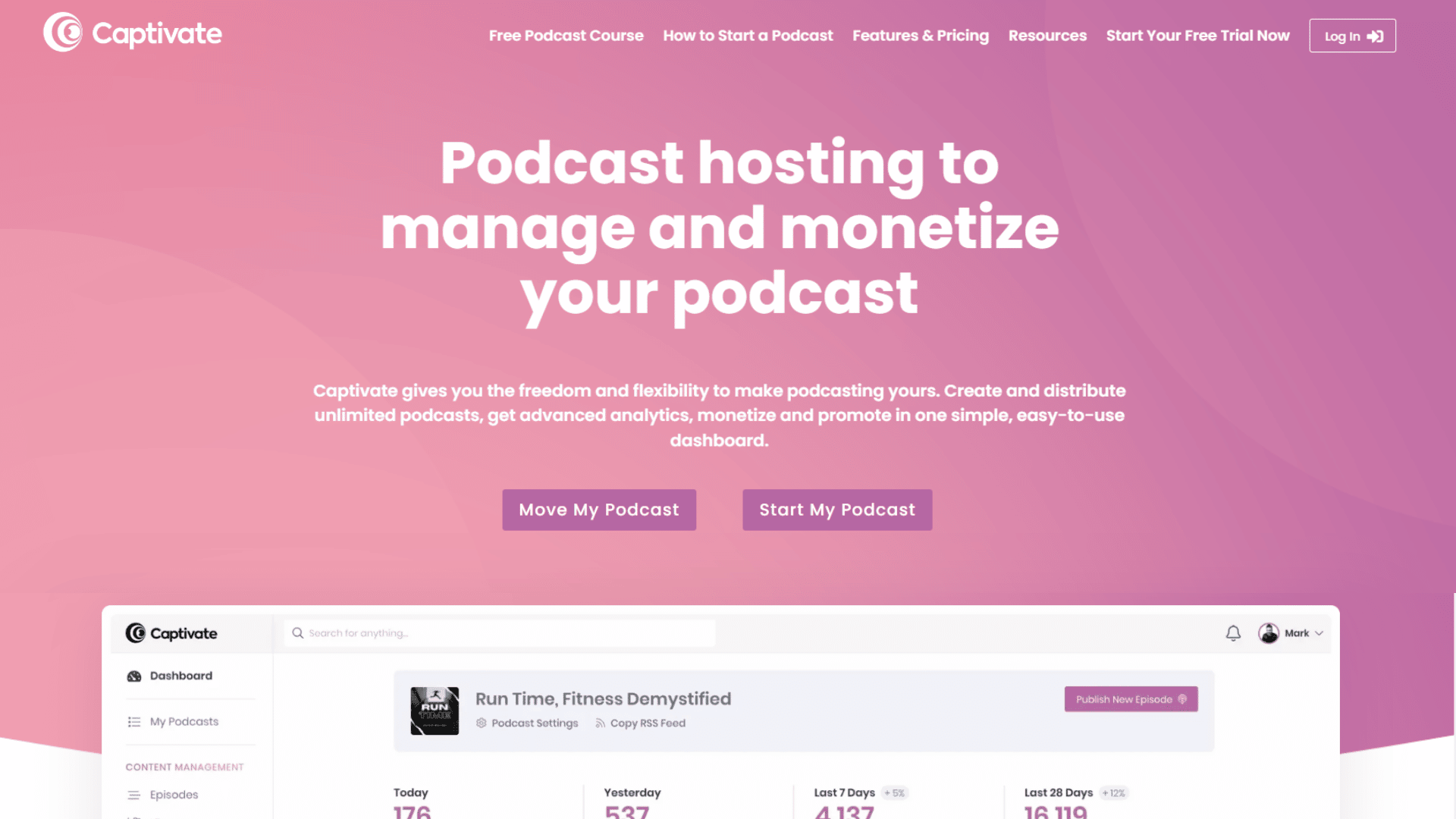
Source: Images from Captivate
Captivate is the best podcast hosting site because of its features, support, and integrations. You can use Captivate to host your Podcast, create a website, and distribute your episodes.
Captivate also offers a course on how to start a podcast and has a community of podcasters you can connect with. It is integrated with popular tools like Zapier, AWeber, and Mailchimp.
This makes it easy to automate your workflow and grow your audience. They have been around for a long time and offer advanced analytics features.
It allows you to reach wider audiences worldwide because of its easy-to-use platform. Its directories are Google and Apple Podcast, Spotify, Amazon, Overcast, Podcast Addict, and Castro.
With Captivate, you get access to realistic analytics, allowing you to see how your Podcast is performing. You can easily download listener demographics, get to know the unique listeners, learn more about your web traffic, and more.
It allows you to create podcast websites, and you can choose from their three different responsive templates. They are mobile-friendly and enable you to create a website within your color preference.
Adding lead magnets, team bios, and email signup forms is easier using Captivate. You can publish episodes from one to another using their ‘feed drop’ feature.
You have an option to create a private for members-only Podcast using Captivate.
What’s great about this Podcast hosting service is that it allows you to learn SEO, podcast marketing, tips to get sponsors and more listeners, and access to a community of accountability buddies.
With different tools available in Captivate, you can ensure that your Podcast will monetize and grow more than you expect.

Source: Images from Captivate
WHAT WE LIKE:
- Unlimited hosting
- Built-in CTA (call to action)
- No limits to adding team members
- You can upload unlimited storage
- Available Podcast on Apple, Spotify, and more
- Customizable team roles
- Email marketing integration
- Custom playlist collection
- Allows to use the domain name with no additional cost
- Complete shows under one account
- Transcription feature available
- Create a shareable playlist easily
Pricing Plan:
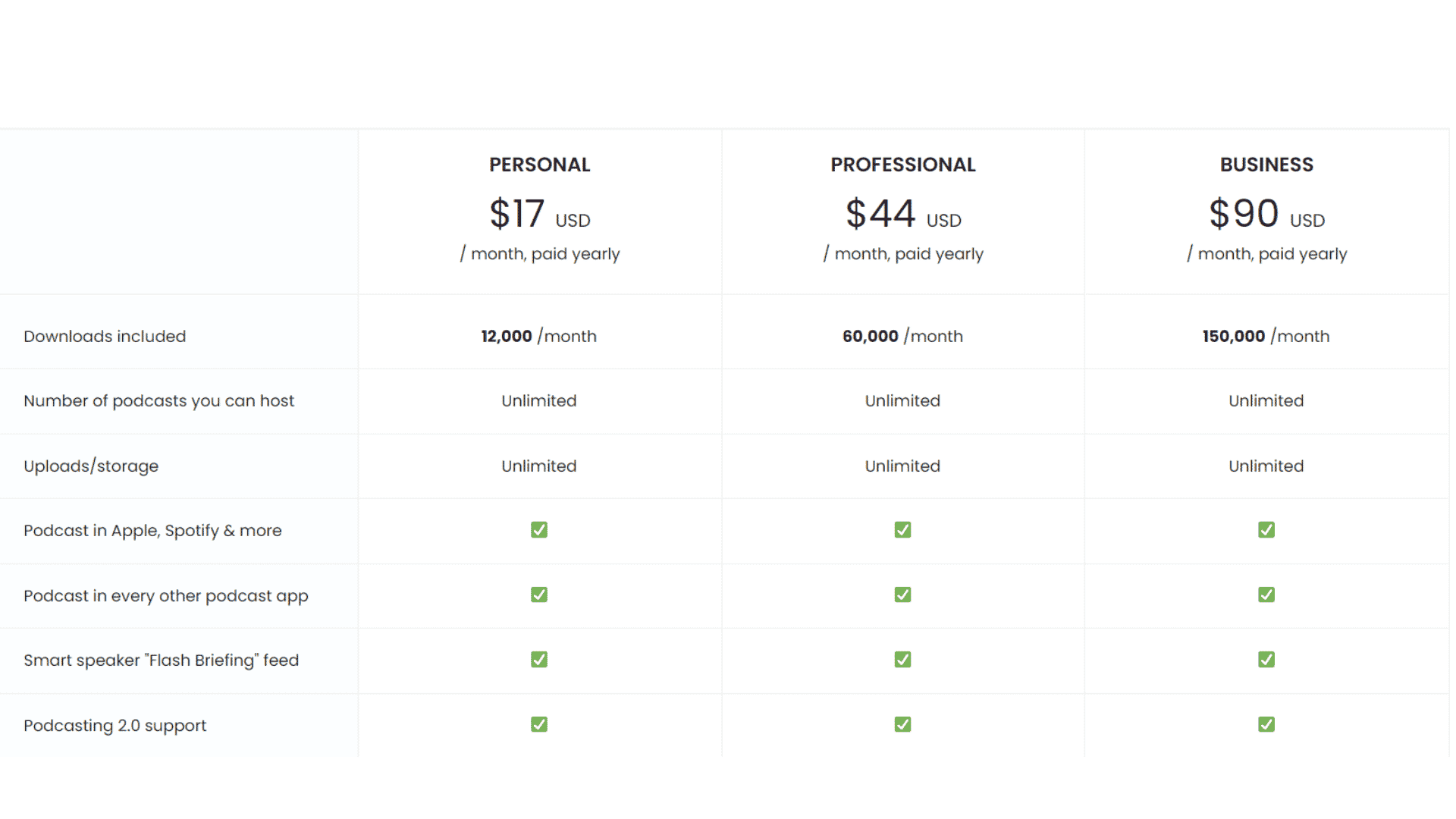
Source: Images from Captivate
Captivate is not a free podcast hosting platform. They provide a 7 days trial to their three paid pricing plans.
- Personal Plan – $17 USD (up to 12,000 downloads per month)
- Professional Plan – $19 USD (up to 60,000 downloads per month)
- Business Plan – $90 USD )up to 150,000 downloads per month)
Castos
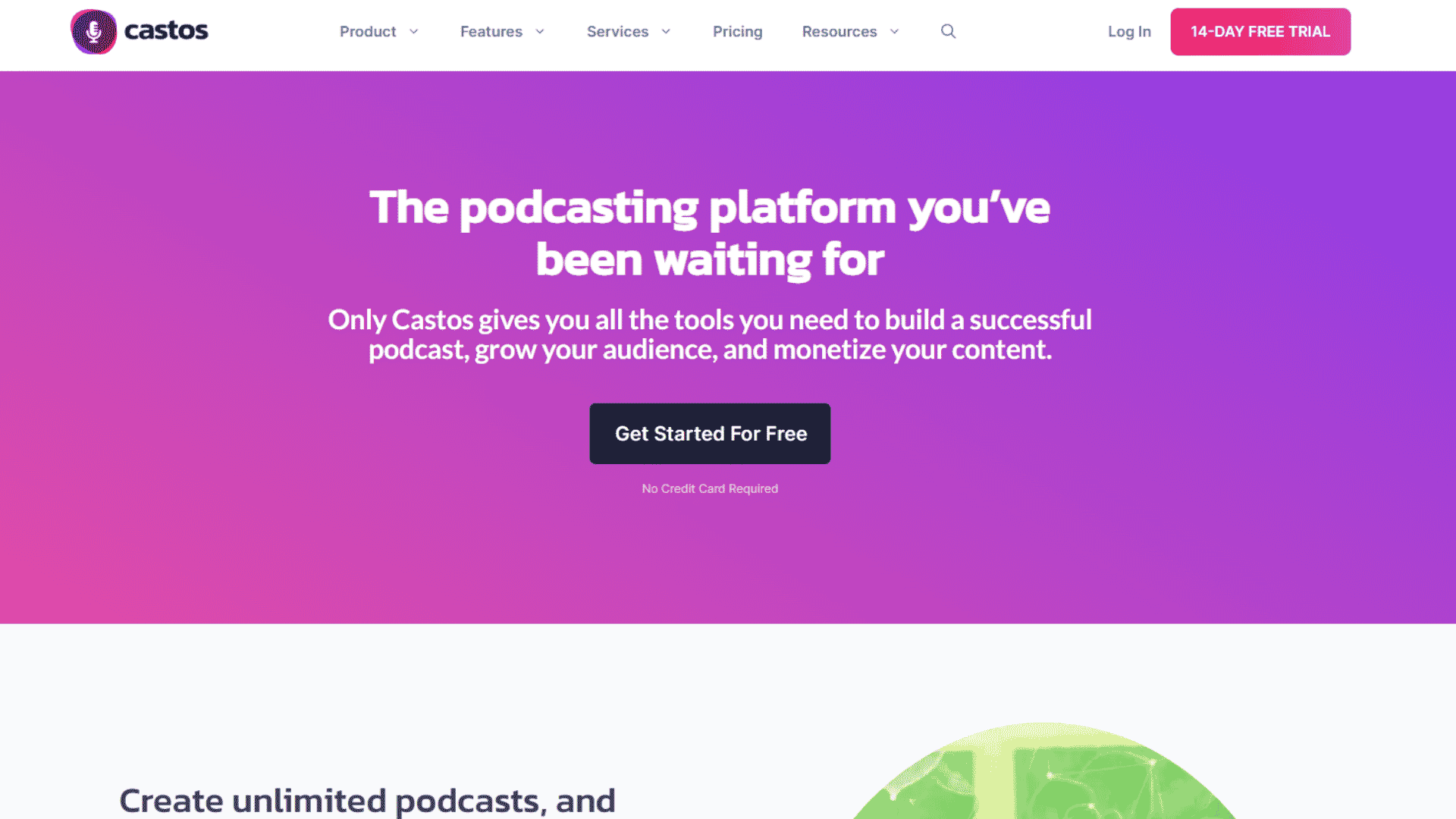
Source: Images from Castos
Castos offers unlimited storage and bandwidth, so you can host as many podcast episodes as you want without worrying about exceeding your allotment.
It makes it easy to distribute your Podcast to all the major platforms, including iTunes, Google Play, and Stitcher.
It provides detailed analytics to track your listener growth and engagement over time. It has a generous affiliate program that can help you offset the cost of your subscription.
It is integrated with the Simple Podcasting WordPress plugin, allowing you to easily upload new episodes and manage your feed from the WordPress platform.
It even allows you to create many separate Podcasts and features in one account at a low price. You have an option to automatically publish your Podcast to Stitcher, Google and Apple Podcasts, Spotify, Amazon Music, and other host apps.
Each Podcast you create using Castos allows you to have a personalized web page, including a unique RSS feed.
What we like about this excellent podcast hosting platform is that it will enable you to create a password to your Podcast and only limits the audience who can access your show episodes.
This is a huge advantage for premium podcast content or work-related training courses. Amazing, right? You can create up to four long episodes and publish them daily without limits.
If you plan to create private podcasting, your subscribers can use the Castos App to browse and listen to your private content without hassle.
Worry no more if you’re worried about creating a webpage for your Podcast and don’t know how to code. Castos allows you to create a webpage with no coding skills required.
You can choose from their different fonts and themes, customize your podcast website color scheme, connect your social media accounts, include a subscribe button, and use your domain. Migrating your existing podcast host to Castos is more accessible with one click.
You have an option to use their editing podcast services which are priced per episode. They have a team of writers, marketers, and audio engineers who can help you with your production process.
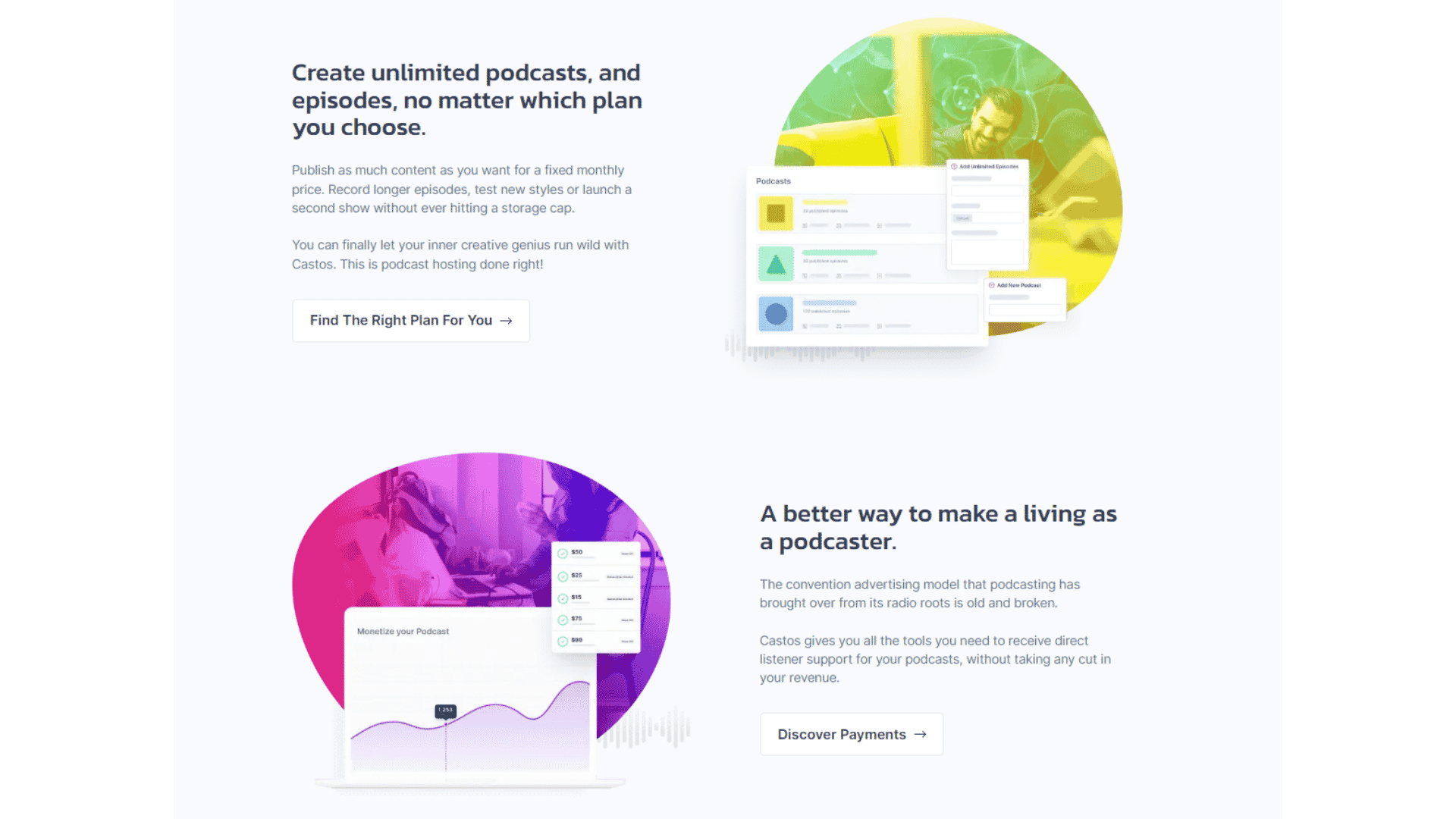
Source: Images from Castos
WHAT WE LIKE:
- Customize player and creation of multiple feeds
- Unlimited podcasts and episodes
- Allows you to create a free customizable podcast website
- Audience, top episodes, and listening behavior insights
- Automated Youtube republishing and automation
Pricing Plan:
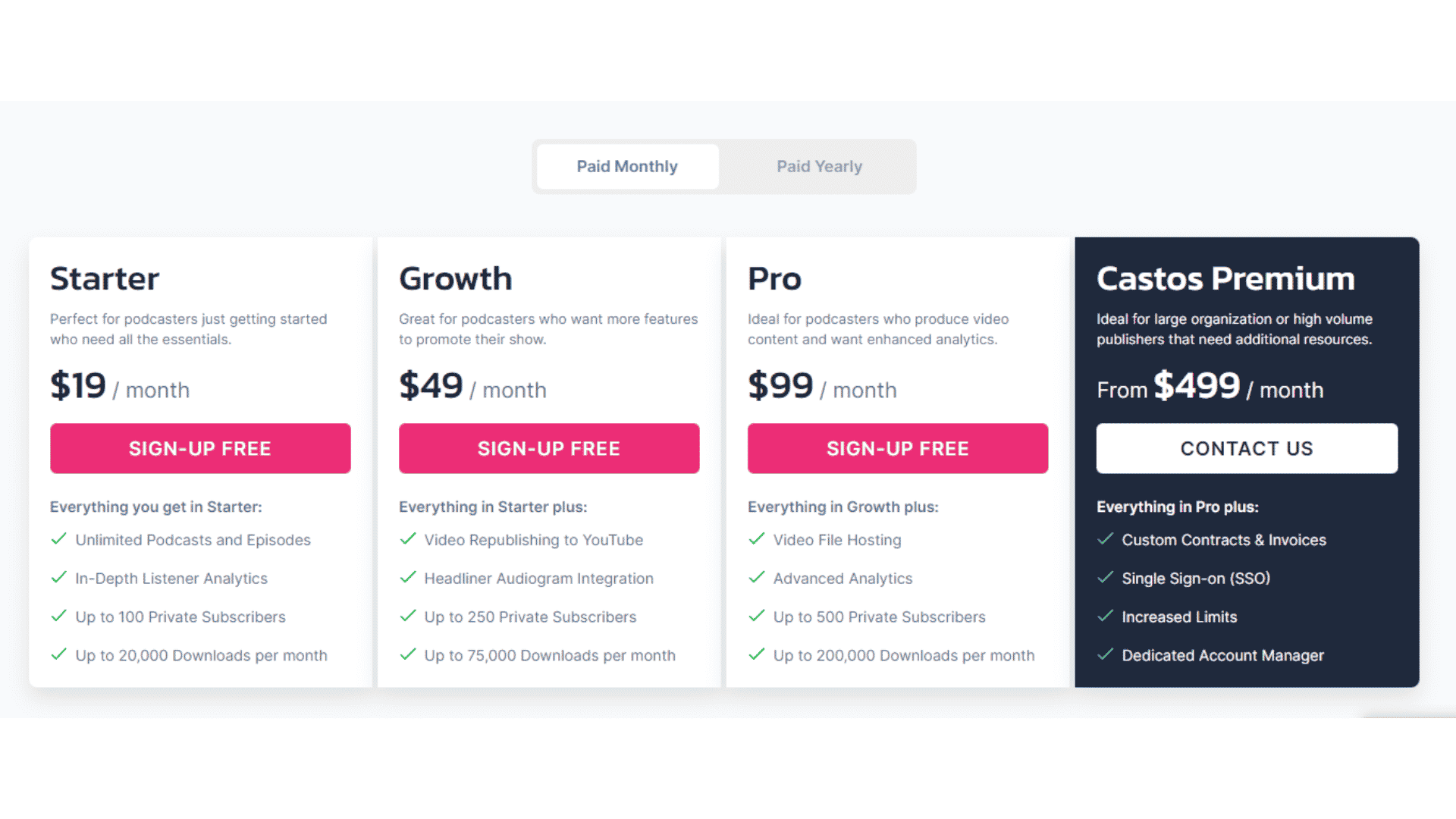
Source: Images from Castos
Castos is not a free podcast hosting company. You can try their 14 days trial with no credit card required. If you wish to upgrade, you can choose between Castos’ four different pricing plans, which are:
- Starter Plan – $19 (up to 20,000 Downloads per month)
- Growth Plan – $49 (up to 75,000 Downloads per month)
- Pro Plan – $99 (up to 200,000 Downloads per month)
- Castos Premium Plan – $499 per month, perfect for a large organization
RSS.com
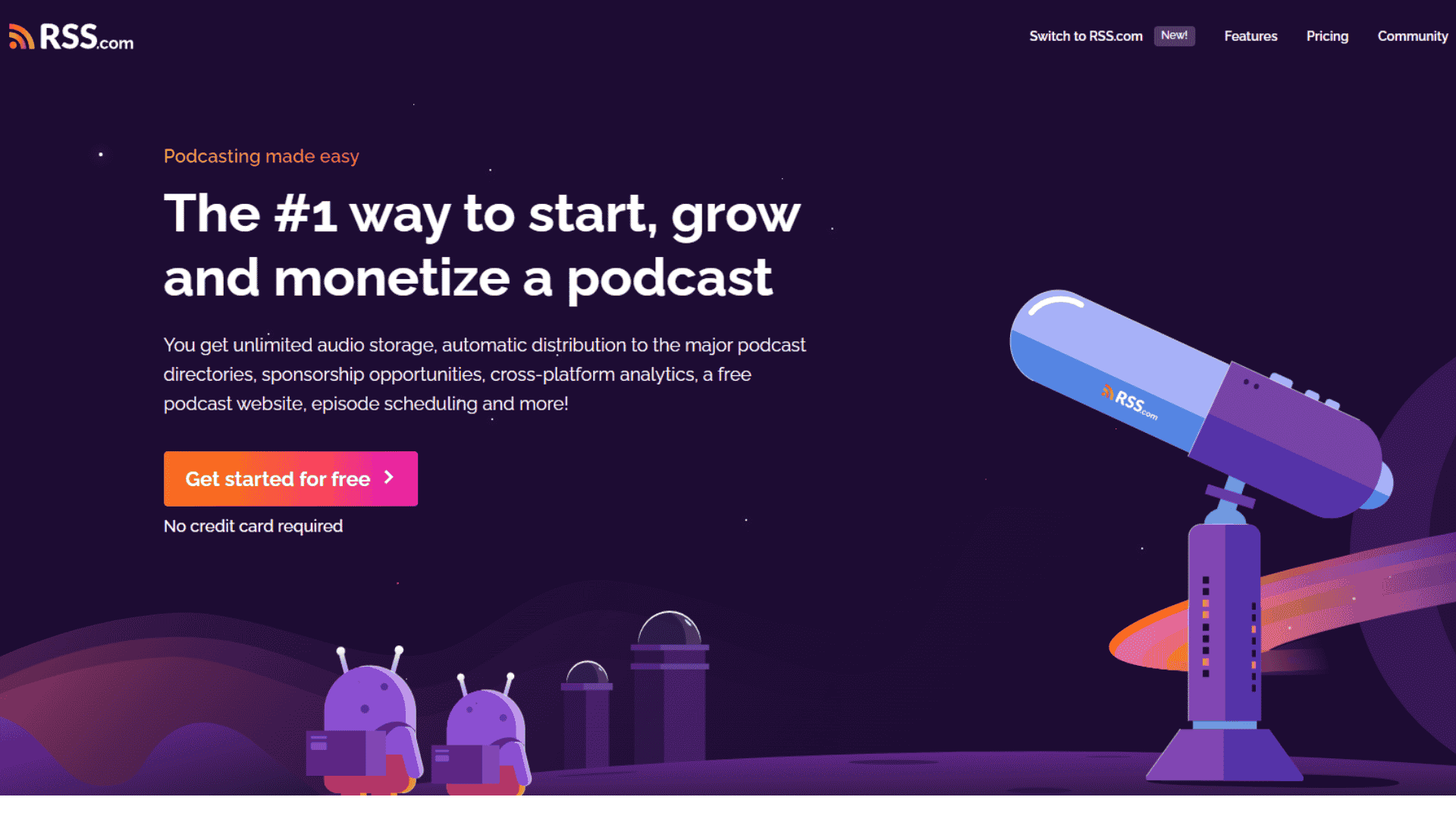
Source: Images from RSS.com
RSS.com is a Podcast hosting company that has been in business since 2014. They offer a variety of features, including unlimited storage, bandwidth, and podcast episodes.
If you’re looking for a podcast hosting site that has lots of amazing features such as powerful analytics, easy-to-use interface, creating podcast websites that fits your recordings then you should definitely consider this platform.
Understanding your audience through cross-platform analytics, knowing the trends, listeners’ geolocation, devices, and platforms use is much easier using this podcast hosting service.
The features that RSS.com offers ensure handling your podcast business growth as it scales. It has a wide range of tools to integrate your social media and schedule your episode, allowing you to manage your podcast show and engage with your audience without the hassle.
Boosting your audience and finding sponsors opportunities for your podcast needs has been made a lot easier using RSS.com. You get in-depth and advanced podcast analytics to create relevant content for your listeners.
You can rely on their customer service, which provides world-class support if you encounter any problems or have questions regarding podcasts.
Automatic podcast distribution of your episodes to Amazon Music, Google, Samsung, and Apple Podcast is much easier and more accessible using the platform.
It allows you to publish in one place, and they’ll take care of the rest for you—less stress and hassle-free.
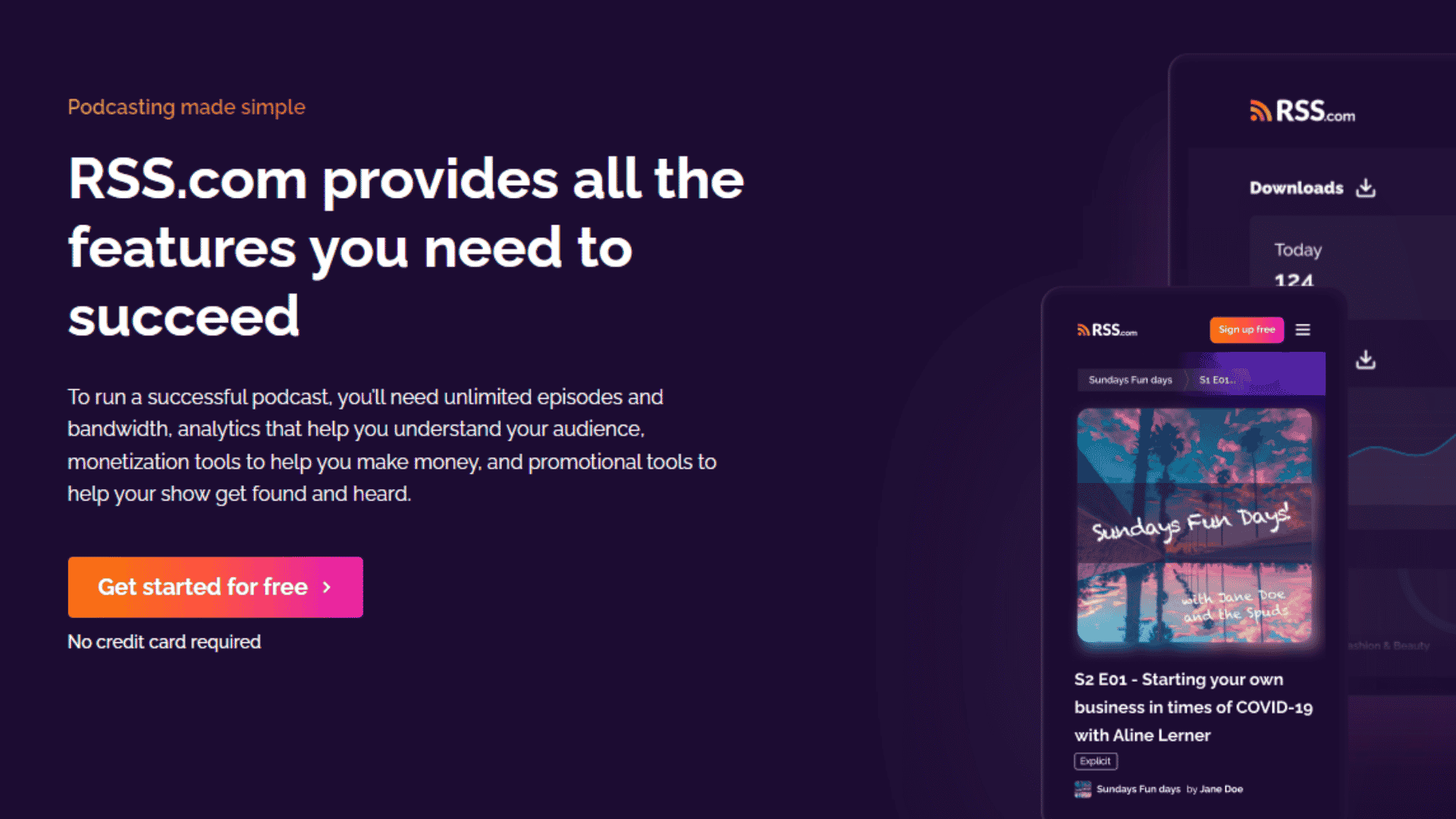
Source: Images from RSS.com
WHAT WE LIKE:
- Unlimited episodes and audio
- Episode scheduling
- Auto submission
- Donate button
- Automatic distribution
- Social media sharing
- 24/7 Customer support
- Cross-platform analytics
- RSS feed for your Podcast
- Free podcast website for your show
- Custom embeddable podcast player
- 30-day money-back guarantee
Monetization via sponsors
Pricing Plan:
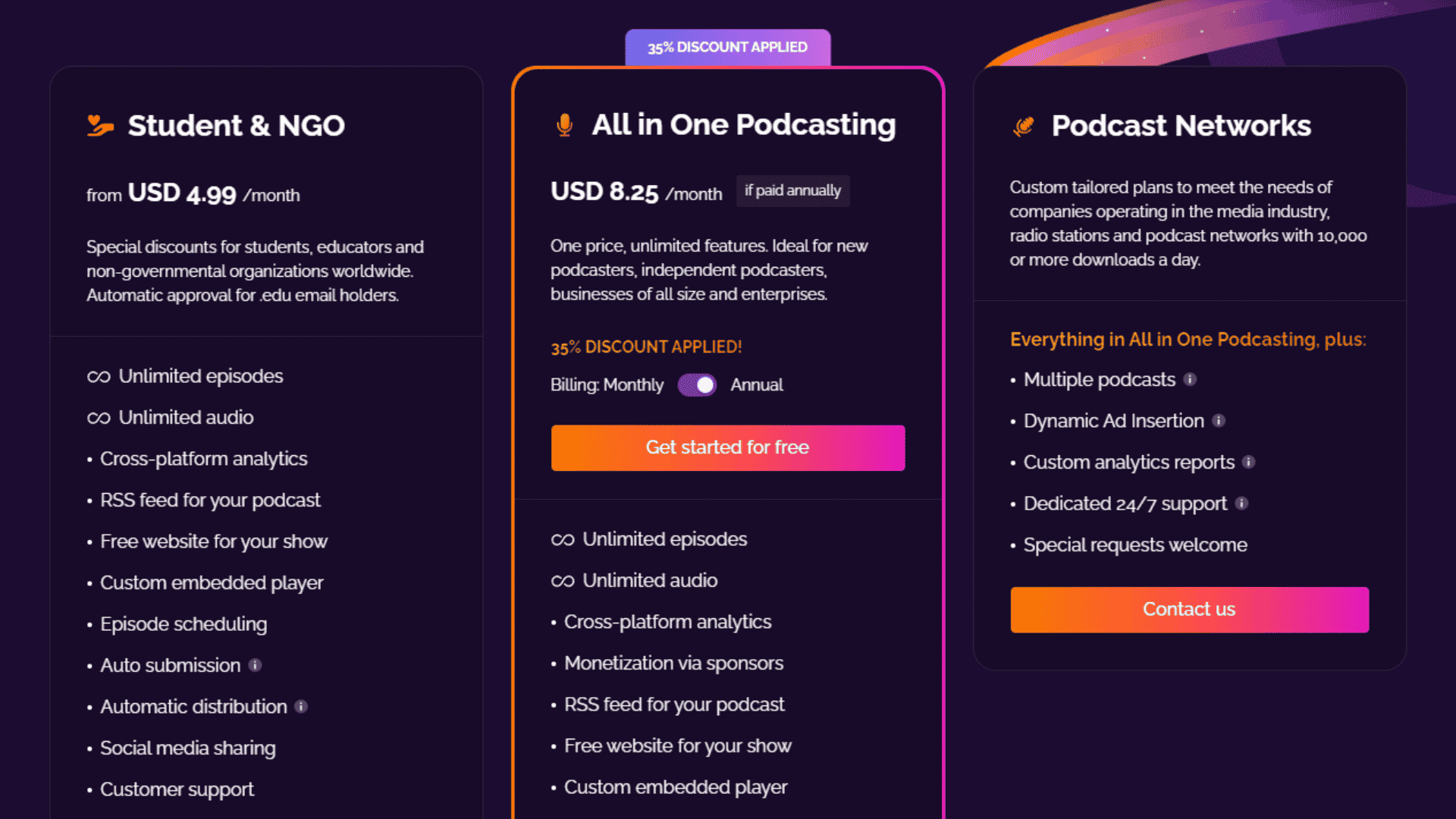
Source: Images from RSS.com
They offer special discounts for educators, students, and NGOs worldwide with their student and NGO plan. What’s great about the RSS feed is that you can try your first episode for 100% free with no credit card required. You can also check their three different pricing plan, which are:
- Student & NGO – $4.99 USD per month
- All in One Podcasting – $8.25 USD per month
- Podcast Networks – Contact RSS.com for a custom-tailored plan for your podcast needs
Resonate
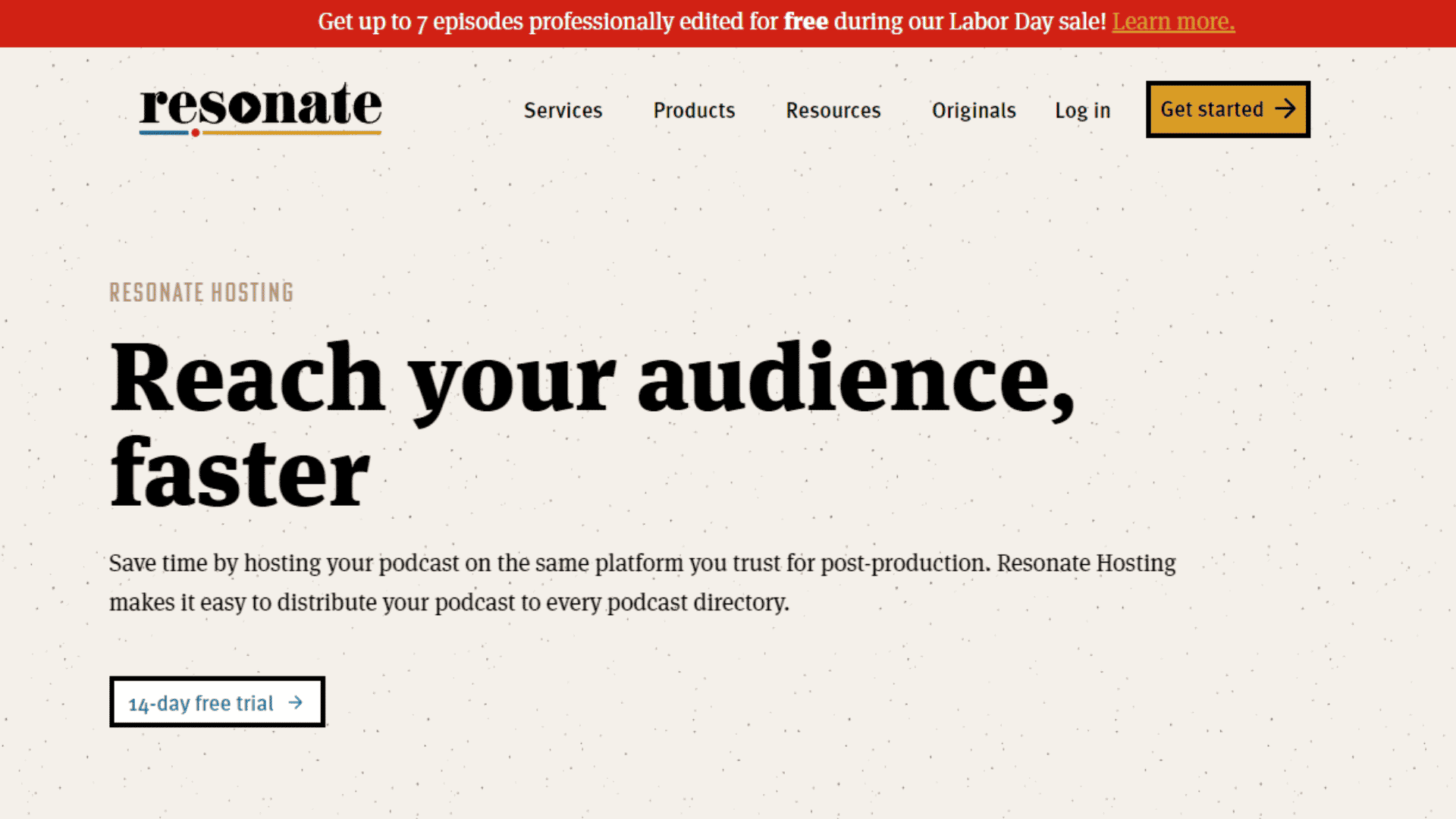
Source: Images from Resonate
Resonate is a relatively new player in the world of podcasting, but it has quickly made a name for itself thanks to its user-friendly interface and powerful features.
One thing that sets Resonate apart from other hosting platforms is its focus on helping podcasters build an engaged audience.
In addition to offering simple ways to distribute and promote your Podcast, Resonate also provides detailed analytics so you can see how your audience interacts with your show.
This feedback can be invaluable in helping you fine-tune your content and grow your listener base.
What makes Resonate the best podcast hosting platform? While many factors contribute to its popularity, its ease of use, robust features, and commitment to helping podcasters build an engaged audience are just a few reasons why so many people are raving about it.
It has a one-click feature allowing you to publish your episodes to different podcast directories with just one click.
Amazing, right? They offer a podcast microsite automatically created once you publish your Podcast.
It has an embeddable podcast player allowing you to promote your podcast episodes much easier.
You can still use Resonate Hosting if you’re a podcaster with your post-production. It has a feature of allowing you to publish your podcast episodes within your set date.
Just like any other podcast hosting service, Resonates allows you to share your show without limit.
You can decide to distribute your podcast feed to the top podcast directories such as Stitcher, Google, Spotify, Apple podcast, and so much more.
You can even manage and insert podcast ads anywhere in your episodes. You can create a membership podcast, university-related episodes, and Podcasts for your work-related. It offers powerful tools for building private hosting for your podcast needs.
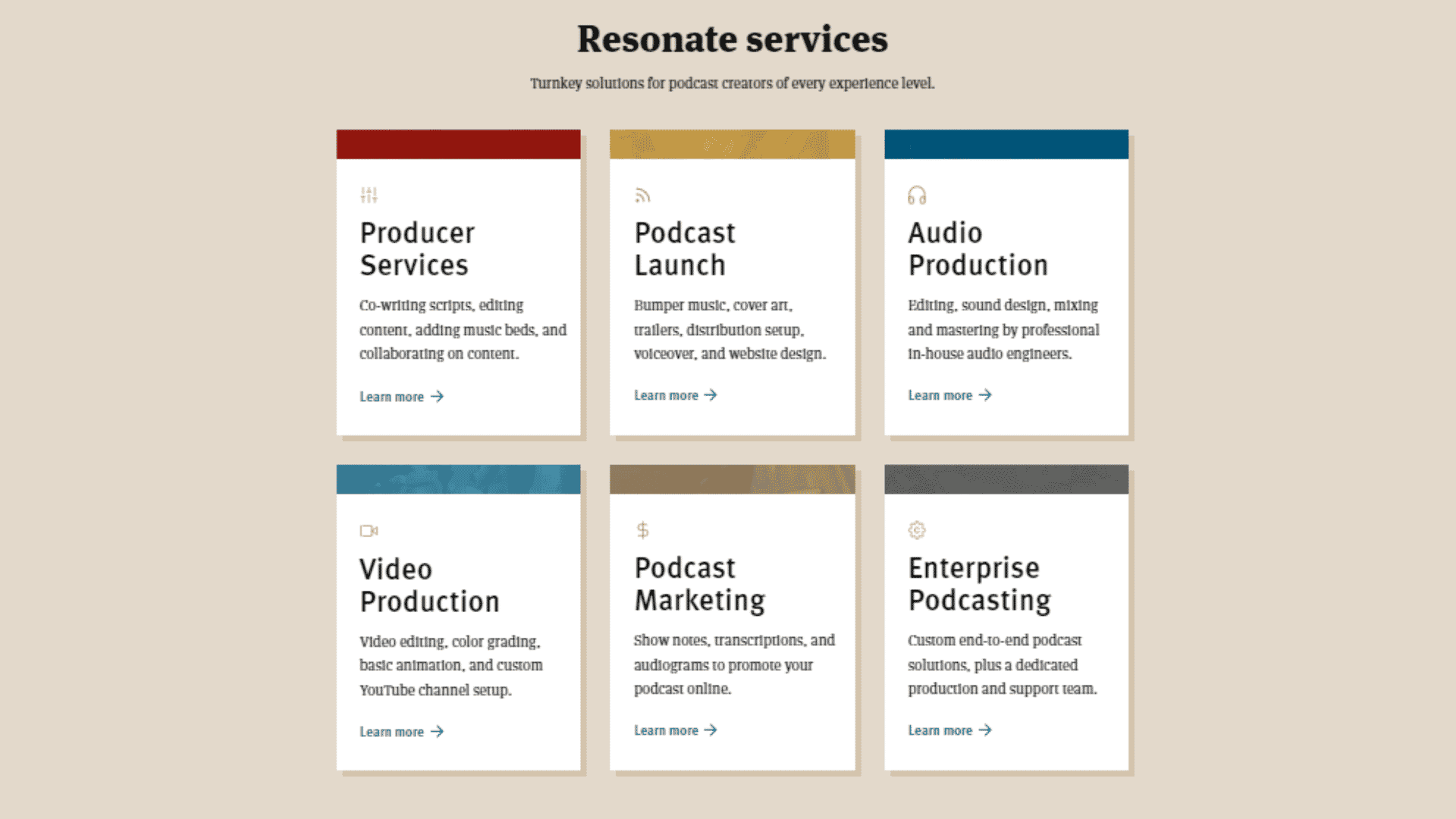
Source: Images from Resonate
WHAT WE LIKE:
- Embed Player
- Transcriptions
- Podcast Microsite
- Live Chat Support
- Dynamic Ad Insertion
- Private Hosting Podcast
- Host video podcasts
- In-depth Analytic Dashboard
- Detailed Embed Player Analytics
- Unlimited Podcasts and Episodes
- Unlimited Downloads and Show Users
- Private Slack Channel with Resonate Team
- Embed player branding removed
- Live chat, phone support, and slack
- Premium Podcast Microsite Themes
Pricing Plan:
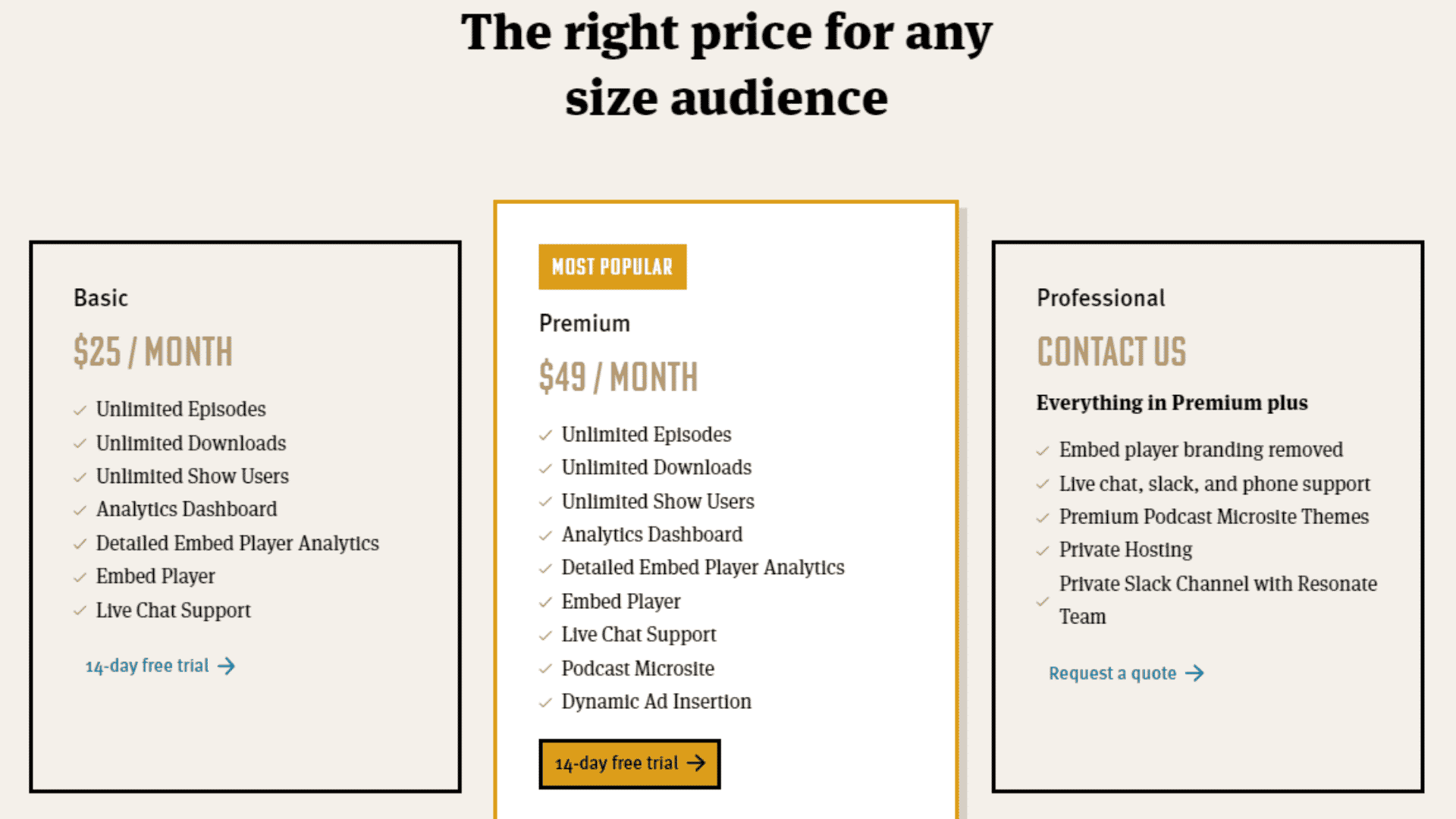
Source: Images from Resonate
You can try the three pricing plans of Resonate for a 14-day trial, which are:
- Basic – $25 per month
- Premium – $49 per month
- Professional – Contact Resonate directly for the Professional pricing plan
Buzzsprout
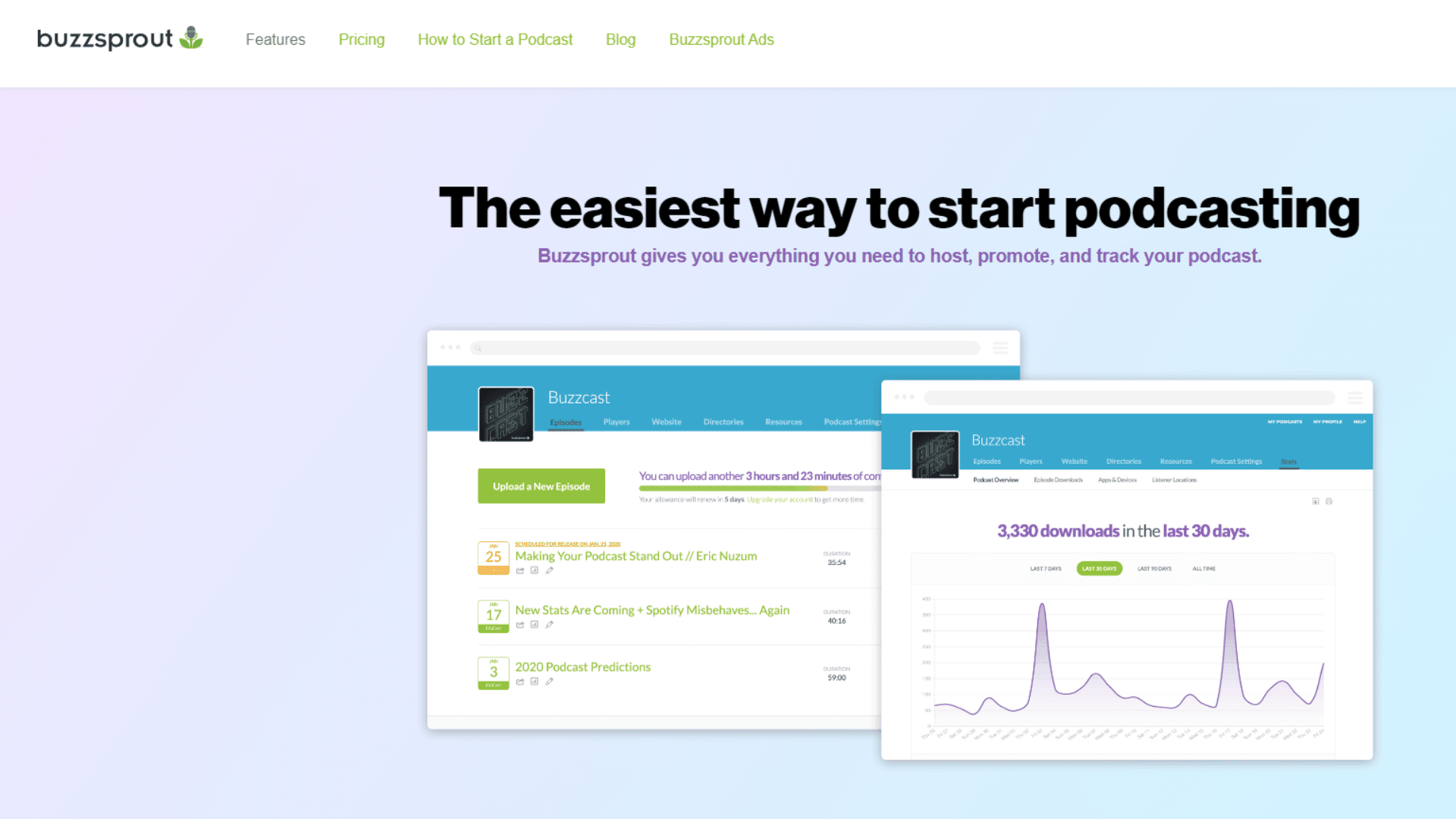
Source: Images from Buzzsprout
Buzzsprout is a podcast hosting and distribution company offering plans for individuals and businesses. One thing that sets Buzzsprout podcast hosting apart from other Podcast hosting companies is its ease of use.
With Buzzsprout, you can easily create and manage your Podcast, and the company provides helpful tutorials to get you started. It offers several features designed to help you grow your audience and promote your show.
For example, you can use the company’s website to create a custom landing page for your Podcast and add call-to-action buttons to encourage listeners to subscribe to your show.
And if you’re looking for podcast monetization, Buzzsprout offers features like dynamic ad insertion that can help you generate revenue.
This podcast host made podcasting much more accessible and straightforward without being limited with the features.
Their dashboards are easy to understand and navigate, giving you a lot of time to create content rather than worrying about how to upload and learn to use some of the features.
It’s regularly updated, ensuring the best Podcast hosting features it can provide to its clients.
What’s great about this platform is that it offers many podcast directories to reach millions of listeners by listing your show in Google and Apple Podcasts, TuneIn, Spotify, Castbox, Castro, Overcast, Podchaser, PocketCasts, Alexa, Stitcher, and iHeartRadio.
It has advanced analytics features allowing you to see the apps people use to listen to your show, the total downloads, and the geolocation of your podcast audience.
You don’t have to worry about the audio type, you have to upload the audio file and Buzzsprout, and they will handle the optimization of your podcast episodes automatically. It has scheduling episode features.
You can use their dynamic content tool, allowing you to remove pre-roll and post-roll segments from your podcast episodes.
You can send messages to your audience regardless of the episodes they are listening to and enjoying.
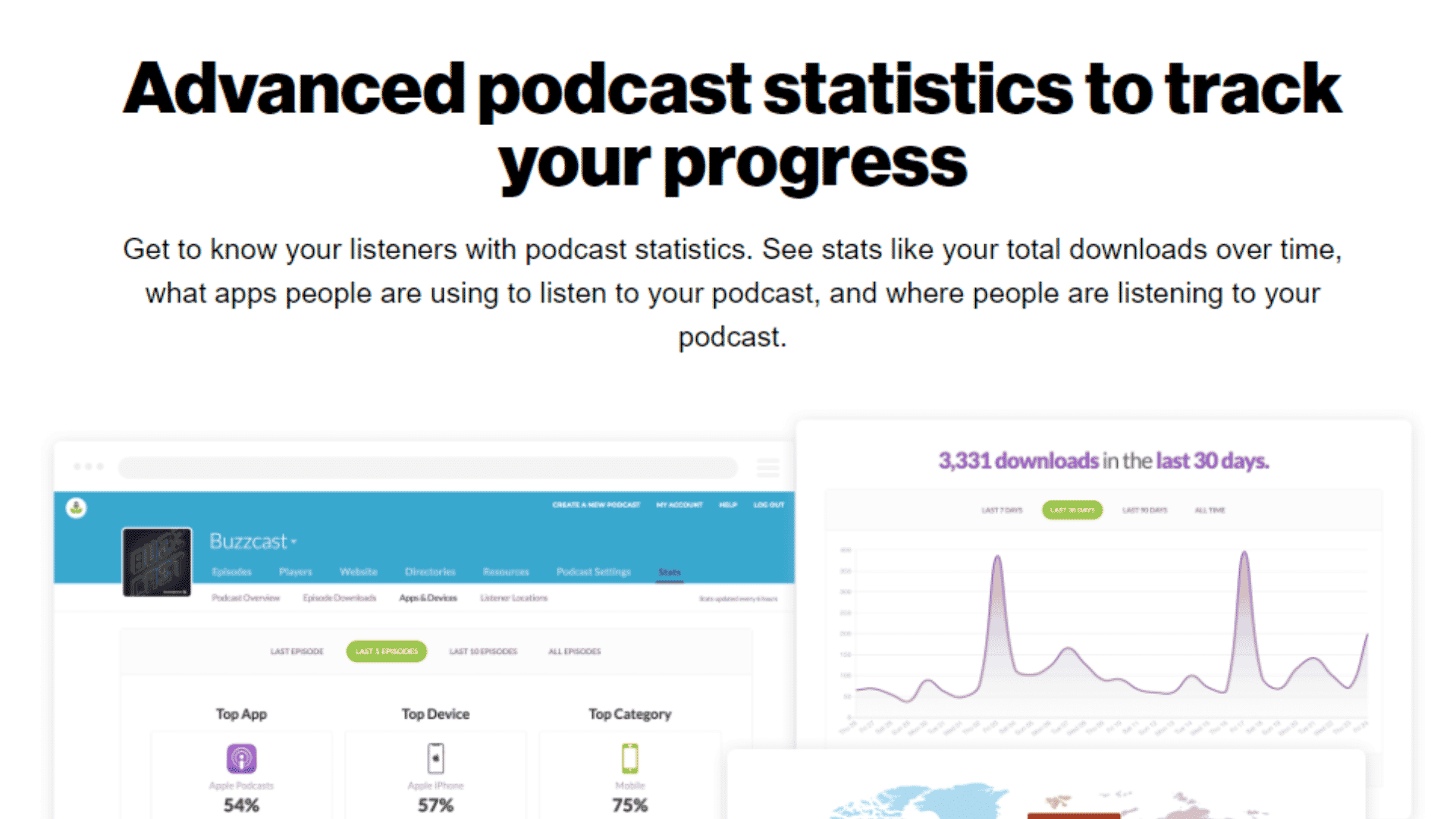
Source: Images from Buzzsprout
WHAT WE LIKE:
- Embed player
- Advanced Stats
- Unlimited Storage
- Publishing workflow
- Import Podcast for Free
- Unlimited Team Members
- Built-in transcription integration
- Affiliate marketing integration
- Automatic podcast automation
- Text editor perfect for show notes
Pricing Plan:
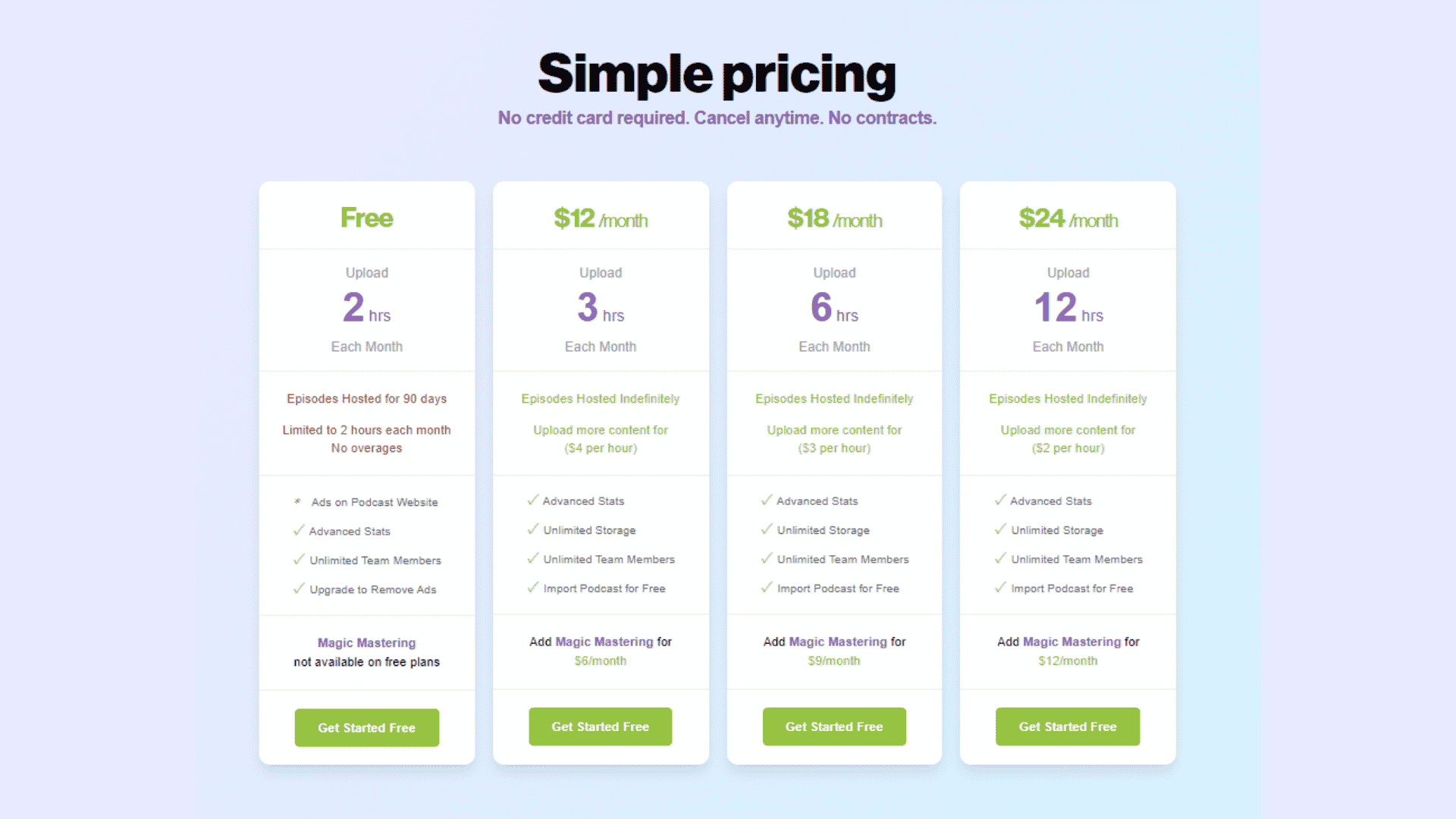
Source: Images from Buzzsprout
Buzzsprout is one of the free podcast hosting platforms. They offer free and three other pricing plans, which you can try for free with no credit card required and cancel anytime. Here are the pricing plans you can choose from:
- Upload 3 hours each month – $12 /month
- Upload 6 hours each month – $18 /month
- Upload 12 hours each month – $24 /month
Transistor
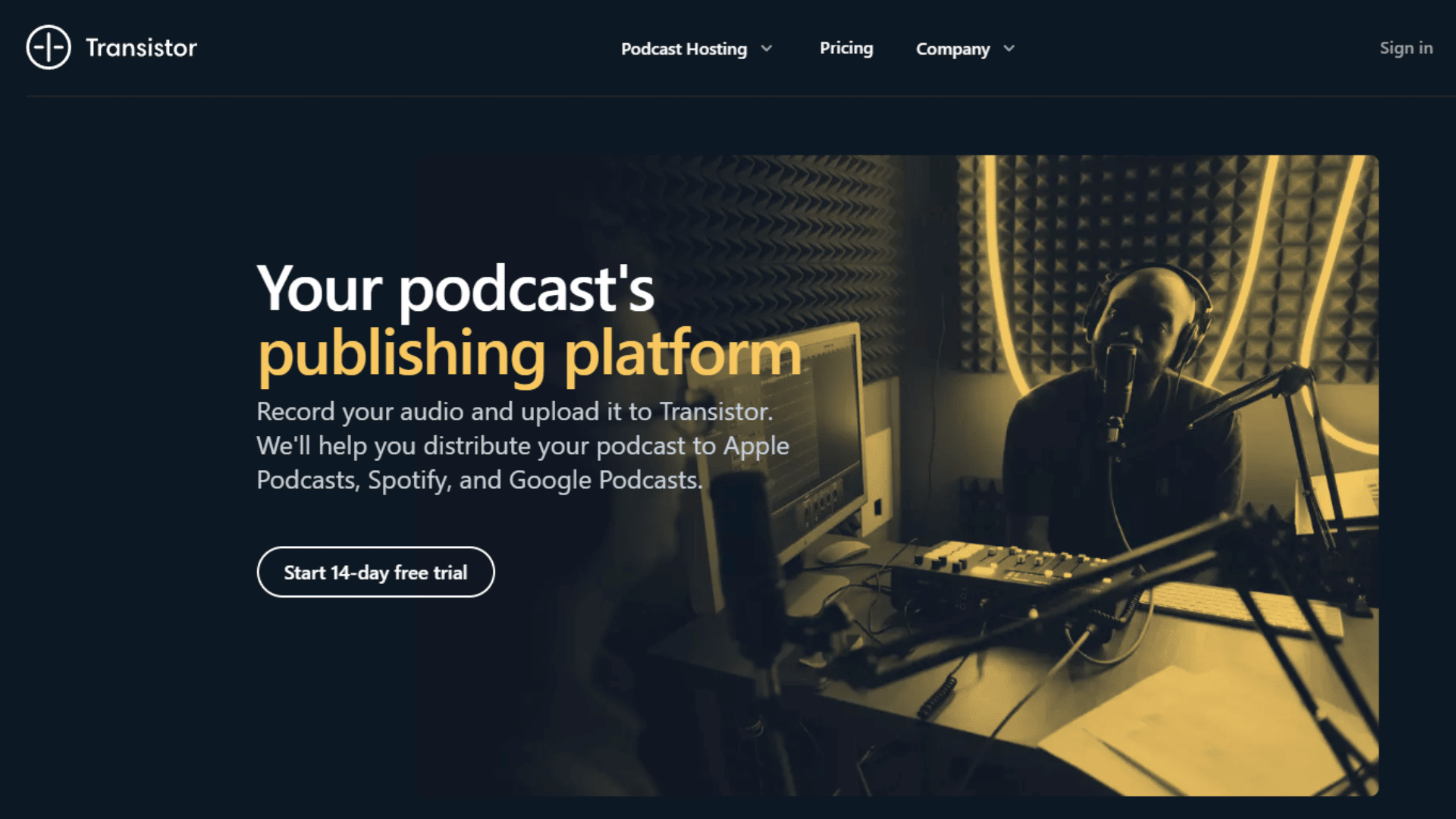
Source: Images from Transistor
Transistor is a hosting platform for podcasts that launched in 2018. The company is based in Brooklyn, New York.
Transistor offers unlimited storage and bandwidth for podcast files and features like website creation, RSS feed management, and listener analytics.
The platform is designed to be easy to use, focusing on helping podcasters grow their audience and improve their show.
Transistor has a free 14-day trial, after which plans start at $19 per month. The company has been featured in numerous publications, including The New York Times, Forbes, and TechCrunch.
It is a popular option for podcasters looking for a reliable and user-friendly hosting platform. You can choose from their different designs, allowing you to generate a website perfect for your show.
Plus, what’s great about this platform is that you can create other Podcasts as long as you want without any additional charge.
You can distribute your Podcast episodes to Overcast, Pocket Casts, Spotify, Google and Apple Podcasts, and many more to choose from.
With their powerful analytics, you can get insights into the number of downloads to your episodes, popular podcast apps used by your audience, trends, and the number of subscribers.
WHAT WE LIKE:
- Advanced analytics
- Built-in podcast website
- Live customer support
- Create unlimited podcasts
- Create private podcasts and track your subscribers
- Dynamic ad insertion (pre-roll, mid-roll, post-roll)
Pricing Plans:
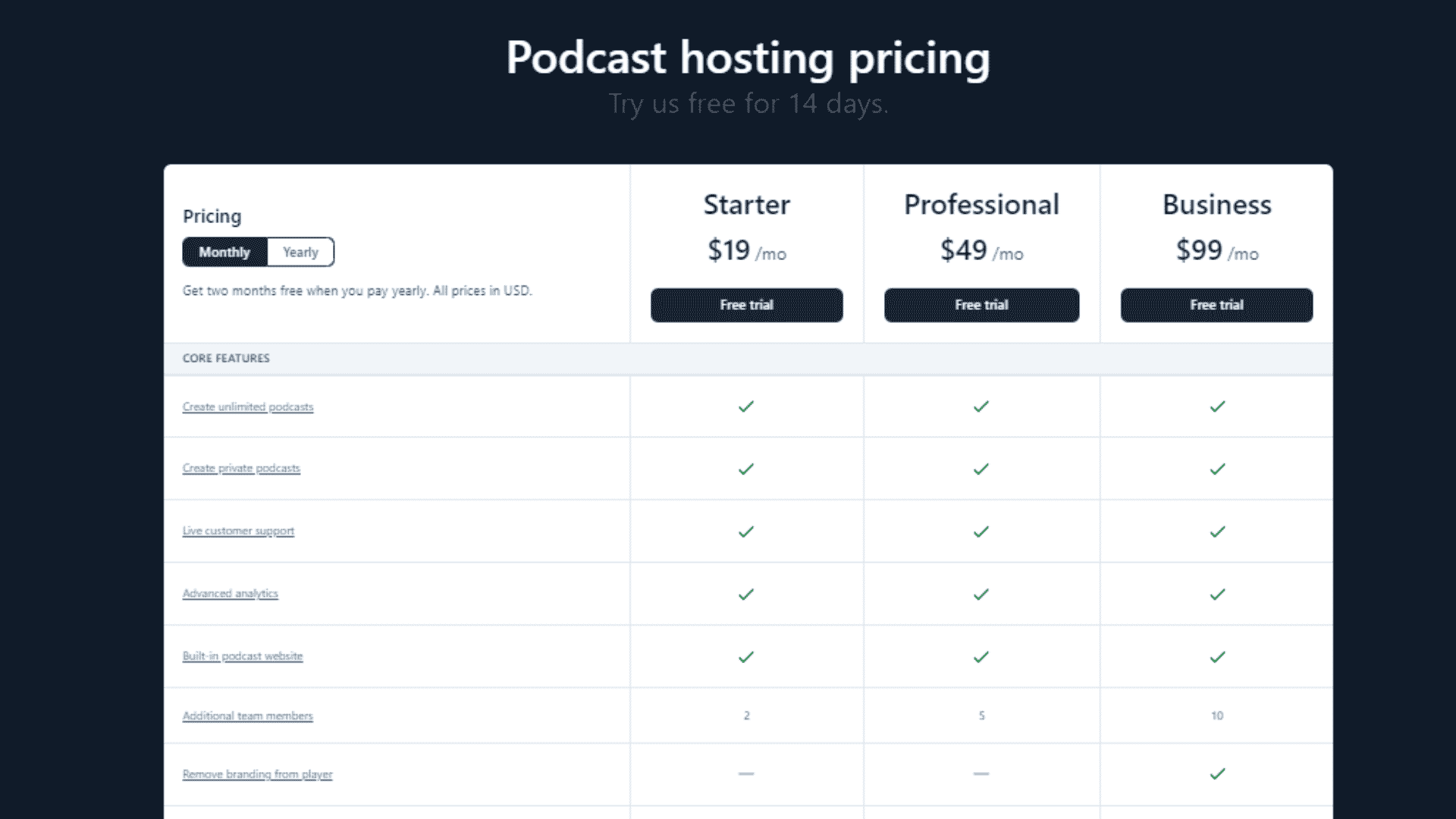
Source: Images from Transistor
As mentioned above, with Transistor, you can try their 14 days free trial before committing to any of their three paid pricing plans which are:
- Starter Plan- $19 monthly (up to 20,000 Downloads per month)
- Professional Plan – $49 monthly (up to 100,000 Downloads per month)
- Business Plan – $99 monthly (up to 250,000 Downloads per month)
RedCircle
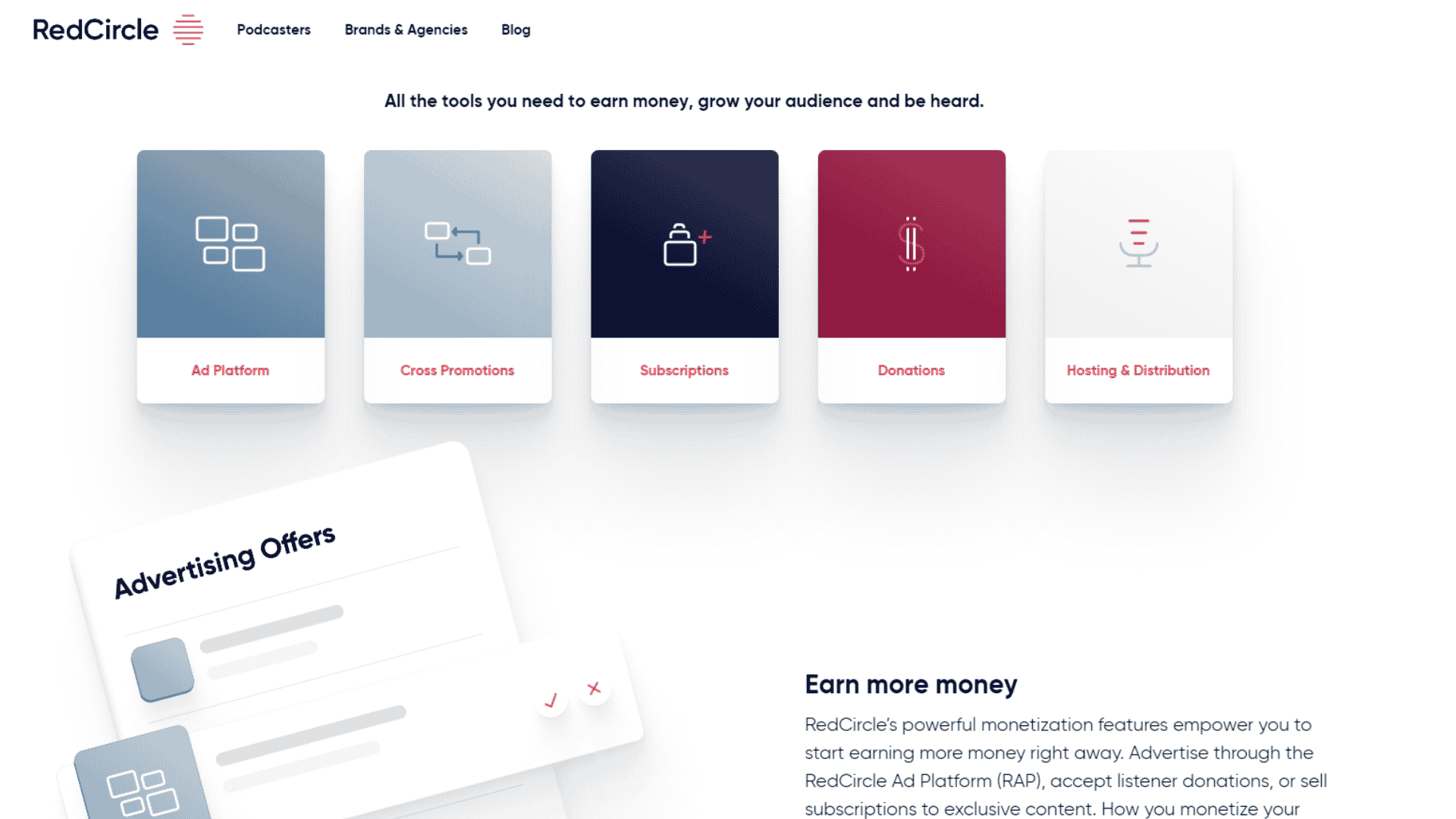
Source: Images from RedCircle
RedCircle is a reliable and user-friendly podcast hosting platform that offers a wide range of features to help launch and grow your Podcast.
With RedCircle, you get everything you need to upload, host, and add co-hosts and guests, use the built-in analytics to track your listener stats and publish your episodes, as well as the ability to monetize your show.
The platform is also constantly evolving to meet the changing needs of podcasters, with new features being added regularly. It is integrated with famous media players like iTunes and Spotify, so your Podcast can reach a wider audience.
It’s a great platform for both publishers and podcasters because it allows them to connect and share their content. It has all the tools you will need to grow your audience and earn money.
With the help of their monetization feature, you can start earning money without the hassle. You can use their Ad Platform to sell subscriptions, receive listener donations, and cross promotions from other shows.
What we love about this platform is the full customization it offers. You have the power to decide where, when, and what content you want to publish in your shows. You can access unlimited storage, downloads, episodes, and free hosting.
It provides lots of directories for you to decide where you want to publish your Podcast, even if you choose to publish it on Youtube.
WHAT WE LIKE:
- Donations
- Instant Payouts
- Generate Video for Episodes
- Ad Free Podcast Webpages
- Cross Promotions Marketplace
- RAP Programmatic Ads
- RAP Host-Read Ads
- Dynamic Insertion for RAP Ads
- Advanced Analytics
- Unlimited Hosting & Distribution
- Subscriptions & Exclusive Content
- Generate Video with only one-click distribution to YouTube
Pricing Plans:
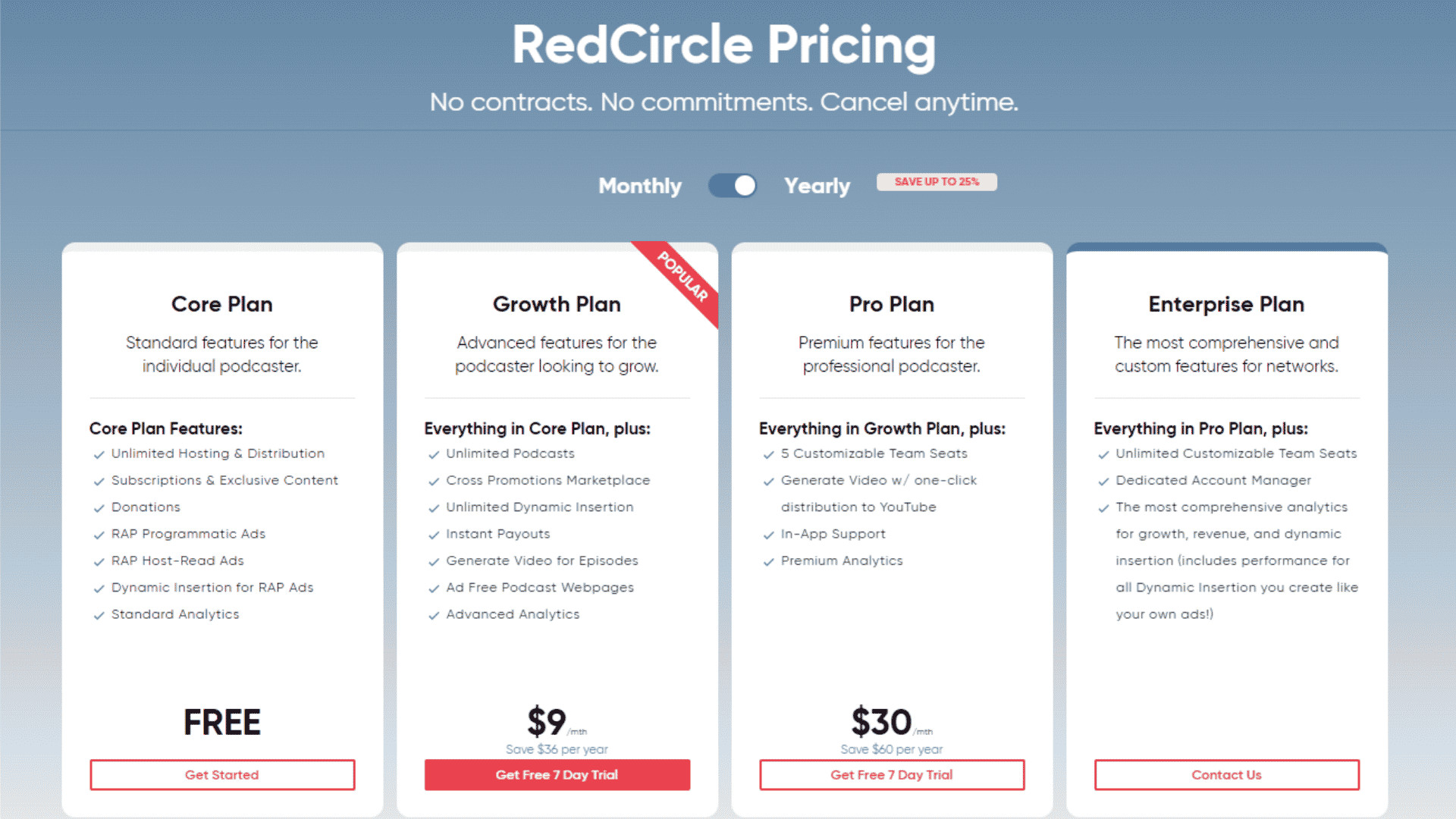
Source: Images from RedCircle
RedCircle offers a free plan with standard features perfect for individual podcasters. If you want to access their premium features, you can choose from their other three paid pricing plans, which are:
- Core Plan – Free forever.
- Growth Plan – $9 per month
- Pro Plan – $30 per month
- Enterprise Plan – If you want to access the most comprehensive and custom features of RedCircle, you may wish to contact them directly for the quotation of their Enterprise Plan.
Spreaker
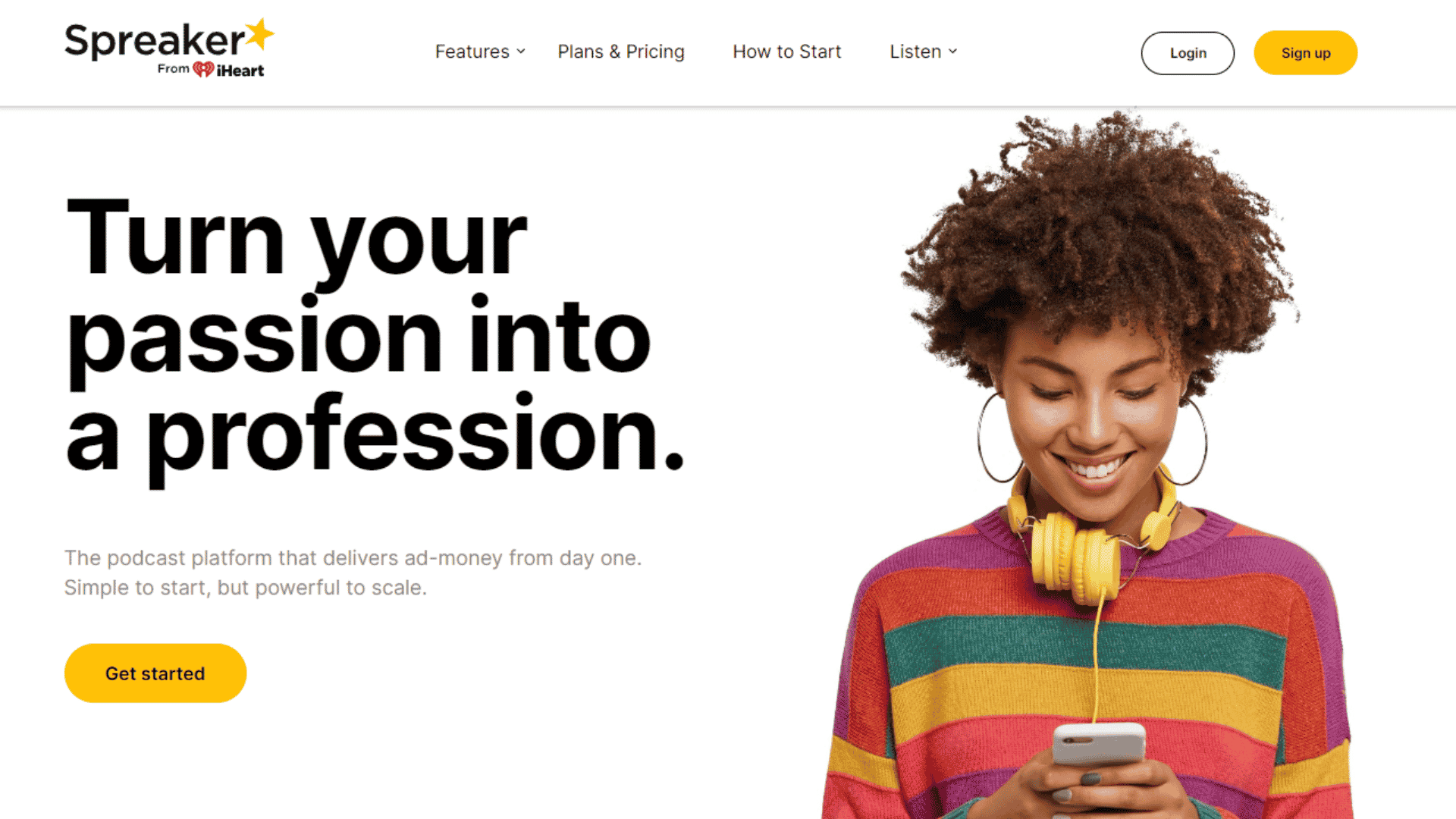
Source: Images from Spreaker
Spreaker is one of the most popular Podcast hosting platforms, and for a good reason. It offers a wide range of features that appeal to novice and experienced podcasters. One of the things that makes Spreaker so popular is its ease of use.
The platform is intuitive and user-friendly, with all the features laid out. This makes it ideal for those new to podcasting who want to get up and running quickly.
Another big selling point of Spreaker is its flexibility. The platform offers various options for hosting, streaming, and distributing your Podcast. This means that you can tailor your Podcast to suit your specific needs.
And if you ever need any help, the Spreaker team is always on hand to offer support. You can access Spreaker through a mobile app or on your desktop.
What’s great about this feature is that it allows you to interact with your audience and even choose to go live in real-time through their chat function.
You can also choose “Offline Mode” if you don’t want to go lobe but still get to record your episode and post it once you’re satisfied with your Podcast.
Users love this platform’s “live production” feature, which allows you to use play effects, act as the DJ, and create a media-rich episode for your Podcast.
WHAT WE LIKE:
- One-click distribution
- Customizable RSS feeds
- Detailed listener analytics
- IAB Tech Lab certified analytics
- Easy Dynamic Advertising Insertion
- Full stack solution for audio publishing
- Auto upload to Spotify, Apple Podcasts, and iHeartRadio
- Collaboration roles and permissions within teams and organizations
Pricing Plan:
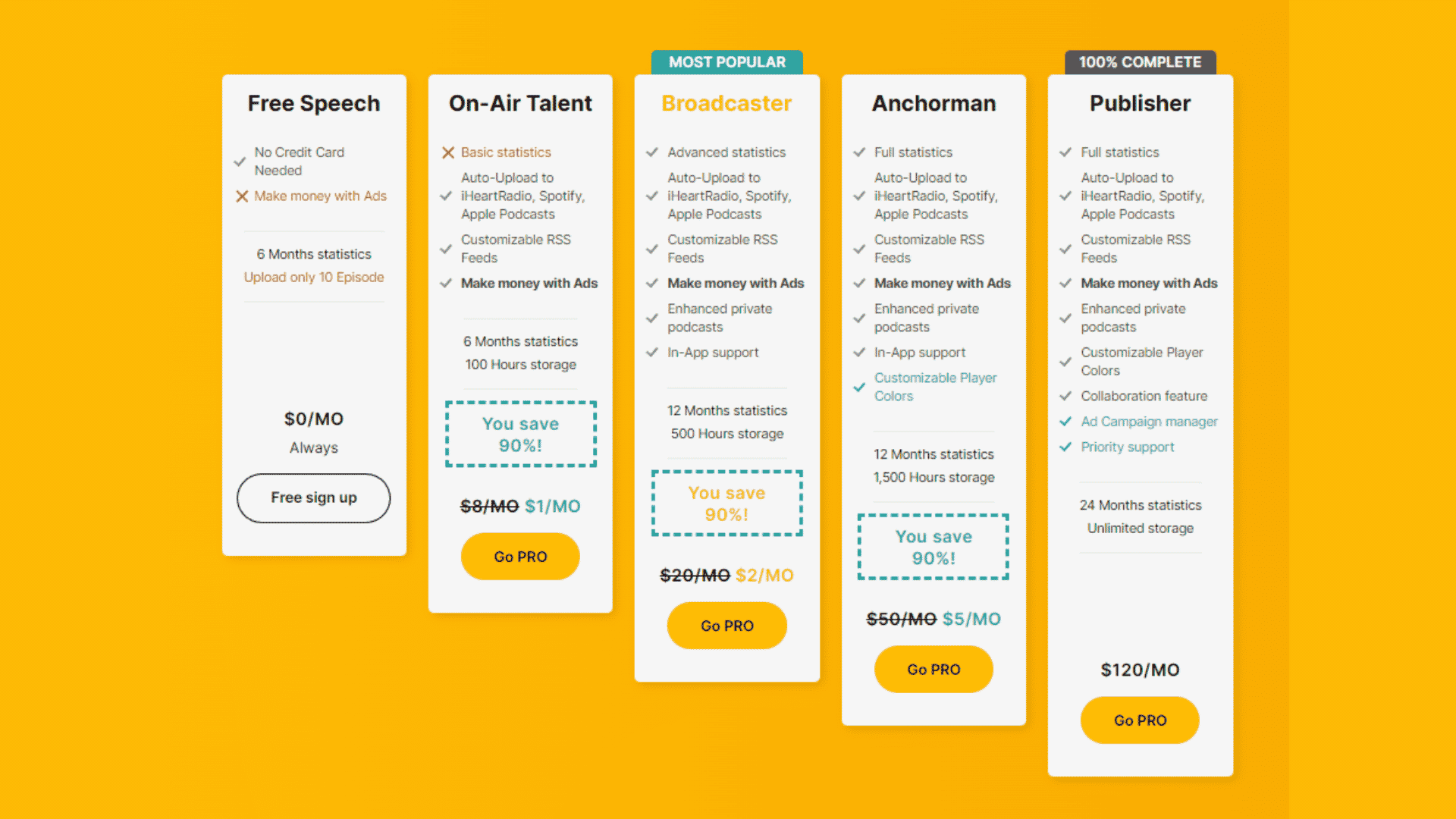
Source: Images from Spreaker
Spreaker offers free podcast hosts without a credit card required, and you can get to upload ten episodes. If you’re considering their paid pricing plans, you can get to choose from their four pricing plans, which are:
- Free Speech Plan – $0
- On-Air Talent Plan – $1 per month
- Broadcaster Plan – $2 per month
- Anchorman Plan – 5$ per month
- Publisher Plan – $120 per month
Blubrry
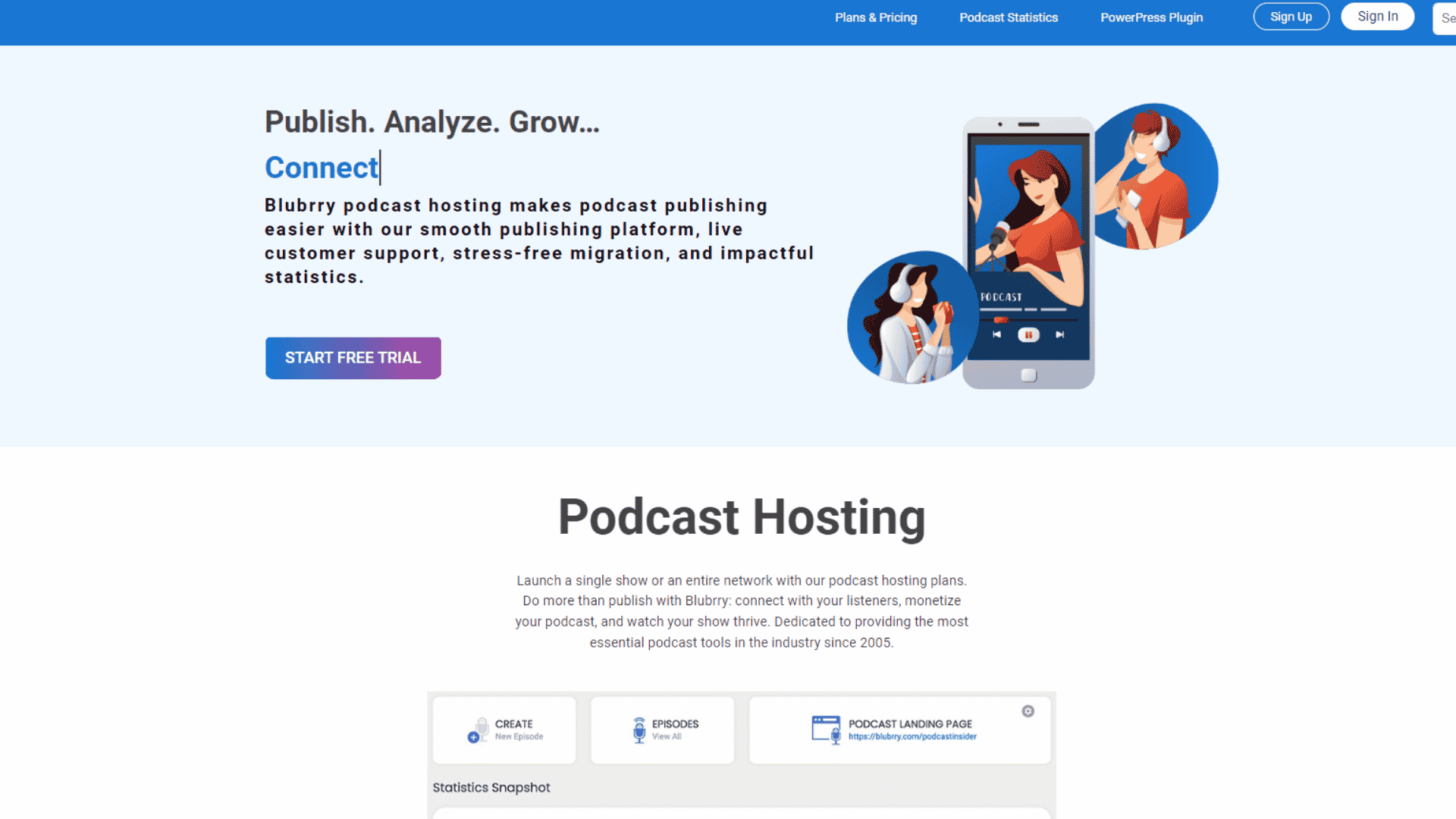
Source: Images from Blubrry
Blubrry is a popular podcast hosting platform that offers a wide range of features for podcasters of all experience levels. What’s great about this is that it provides free podcast training as part of your hosting plan.
One thing that sets Blubrry apart from other podcast hosting platforms is its stats and analytics package. With Blubrry, podcasters can track the number of downloads their episodes receive and where those downloads are coming from.
This information can be invaluable for understanding one’s audience and tailoring content to them. It offers a built-in audio player that can be embedded on websites and social media platforms, making it easy for listeners to access episodes directly from their favorite sites.
While there are many appealing aspects to Blubrry, its comprehensive stats and analytics package makes it an especially attractive option for serious podcasters who want to grow their audience and better understand their listeners.
It is integrated with the PowerPress WordPress plugin. If you don’t use WordPress, you can still upload your episodes and use an embeddable player on other CMS platforms of your choice. With Blubrry, you get access to unlimited bandwidth and downloads without a contract needed.
WHAT WE LIKE:
- Advanced Statistics
- Domain Mapping
- Monetize with Programmatic
- Phone & email tech support
- Unlimited downloads
- Custom embed player
- Free WordPress Site
- Its additional themes & plugins
- DNS management
- Free episode migration
- Podcast Media Kit
- Formal Podcast Training
Pricing Plan:
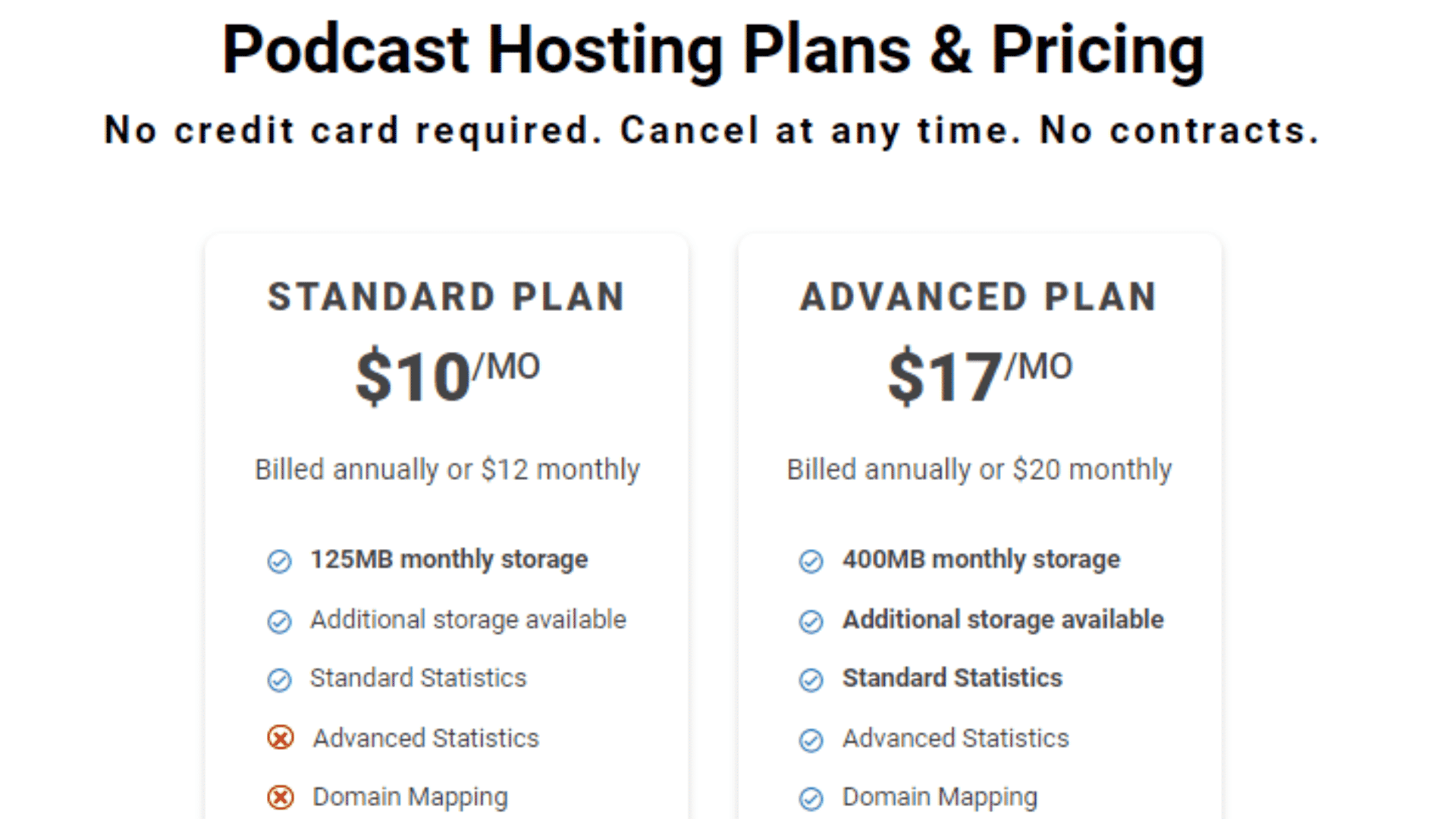
Source: Images from Blubrry
Blubrry offers two different pricing plans with no required credit card; you can cancel anytime.
- Standard Plan – $10 per month with 125 MB monthly storage
- Advanced Plan – $17 per month with 400 MB monthly storage
- Pro Hosting – starting at $100 per month with unlimited storage
Simplecast
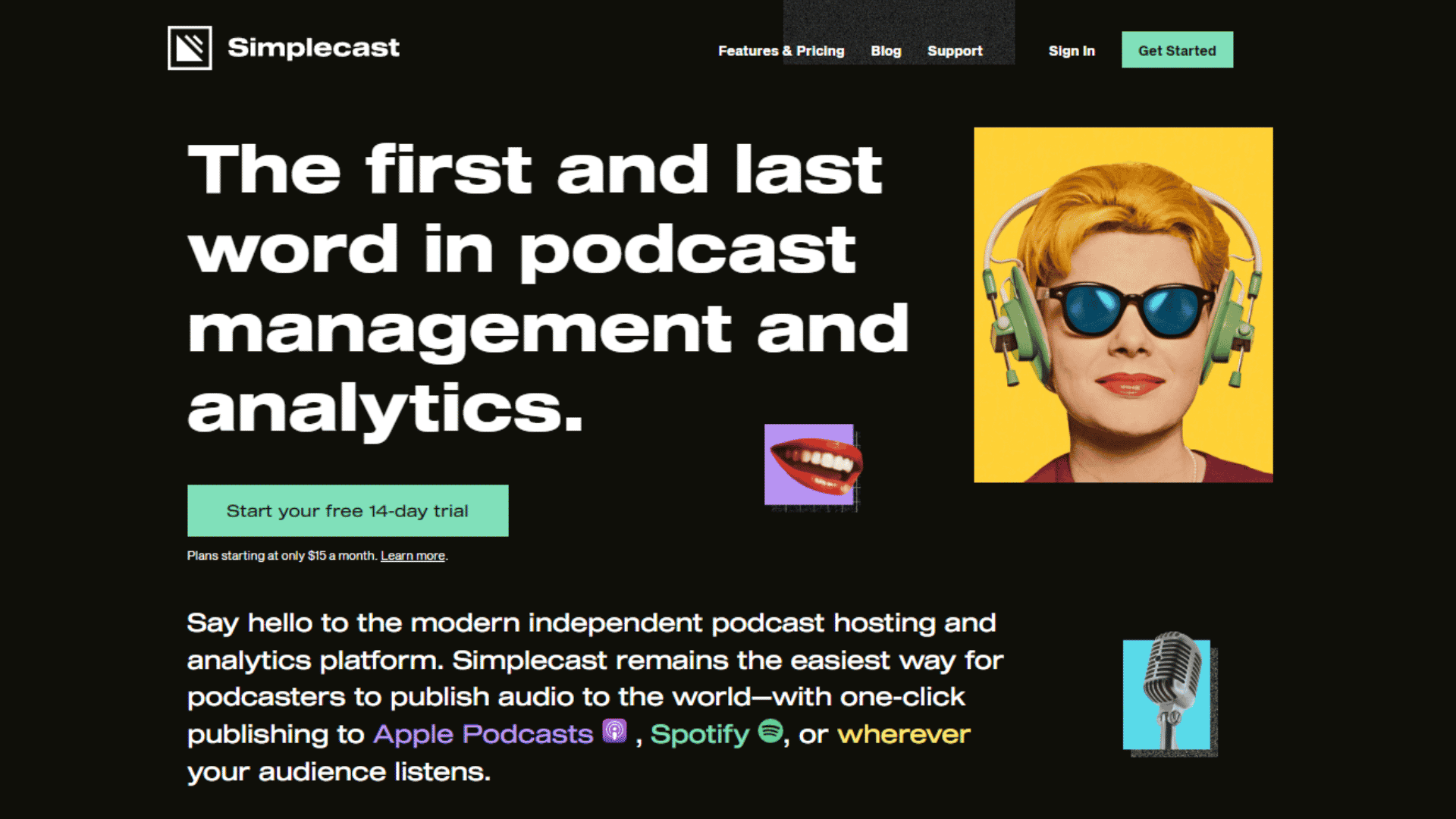
Source: Images from Simplecast
If you’re looking for a reliable, high-quality podcast hosting service, Simplecast is an excellent option to consider. With plans starting at just $15/month, it’s affordable for most podcasters.
And, with unlimited bandwidth and storage, episode editing, and detailed listener analytics, it has everything you need to produce a professional-sounding podcast.
One thing that sets Simplecast apart from other Podcast hosting services is its ease of use and best-looking embeddable player.
Uploading your episodes and customizing your show’s settings is quick and straightforward. No minimum commitment is required; you can cancel your account anytime.
Simplecast provided the most prominent brands with quality hosting services for almost seven years. With a one-click feature it allows you to reach millions of audience and distribute your episodes to what apps your audience are listening to.
With their powerful analytics, you get to understand your listeners and where they listen to your episodes. Staying on top of trends and tracking insights about what parts of your show are getting shared the most are easy to analyze using Simplecast.
If you have questions or encounter a problem regarding your Podcast, their support team is open seven days a week and can assist you with your needs.
WHAT WE LIKE:
- API Publishing
- Full Recast analytics
- Unlimited storage & uploads
- Embeddable episode web player
- City and metro area location analytics
- A secure (HTTPS) site and RSS feed
- Customizable show website with a custom domain
- Allows you to compare up to four episodes of analytics
- Option to distribute to everywhere your audience listens
- Drop-off, episode % completed, and speed reports (web players)
Pricing Plan:
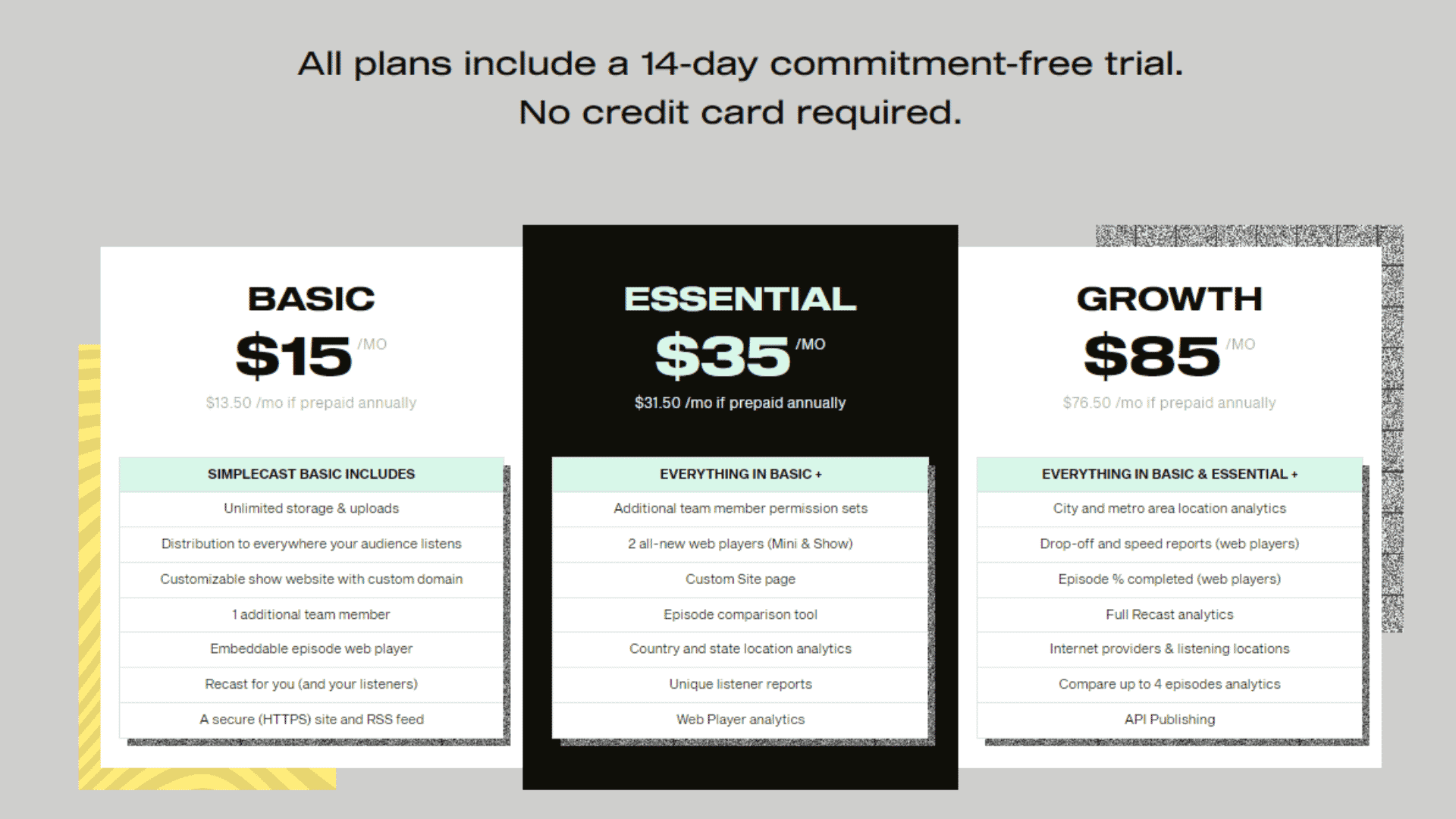
Source: Images from Simplecast
With Simplecast, you can choose from their three paid pricing plans and try them for 14 days. No credit card is required.
- Basic – $15 per month (up to 20K downloads included per month)
- Essential – $35 per month (up to 50K downloads included per month)
- Growth – $85 per month (up to 120K downloads included per month)
Podbean
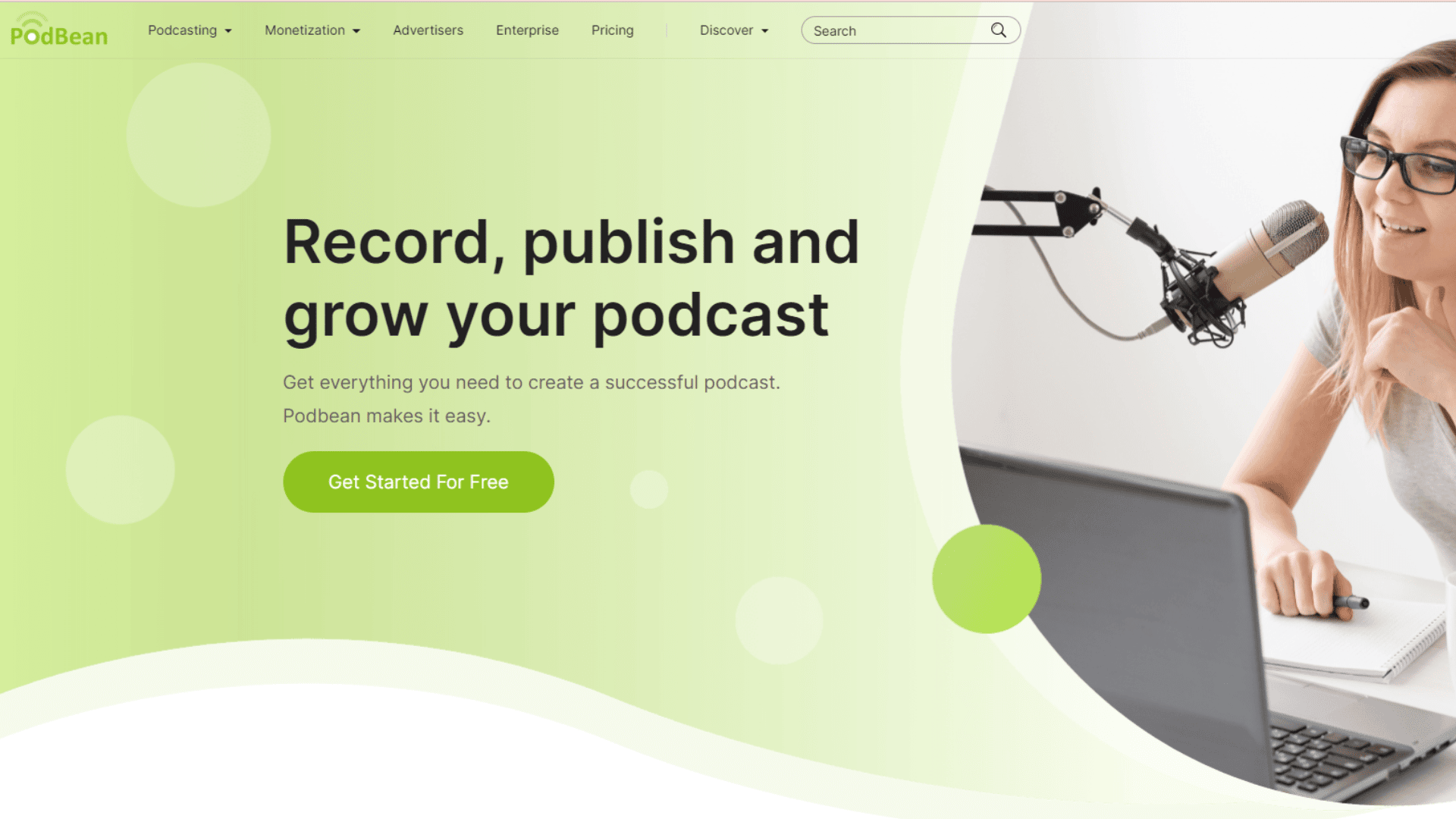
Source: Images from Podbean
Podbean podcast app is an interactive and user-friendly Podcast hosting platform that helps you to record, publish, monetize and promote your podcasts. It has all the features and tools you need to create a professional podcast.
With Podbean, you can record your Podcast directly on the app or upload audio files from your computer. You can also add collaborators so that they can help you with the recording, editing, and publishing process.
Once your Podcast is published, it will be available for listeners to stream on the app or download for offline listening. Podbean also provides powerful marketing and analytic tools to help you promote and grow your Podcast.
You can use the built-in social sharing features to share your episodes on social media or embed your Podcast on your website or blog. You can also use Podbean’s advertising platform to sell ad space on your Podcast and earn revenue from your show.
And with the Podbean Insights tool, you can track your listener data and analytics to see how your Podcast is performing.
WHAT WE LIKE:
- Easy Publishing
- Live Chat Support
- Unlimited Podcasting
- Comprehensive Stats
- Offers Advanced IAB Certified Stats
- Easy to Distribute Your Podcast Everywhere
Pricing Plans:
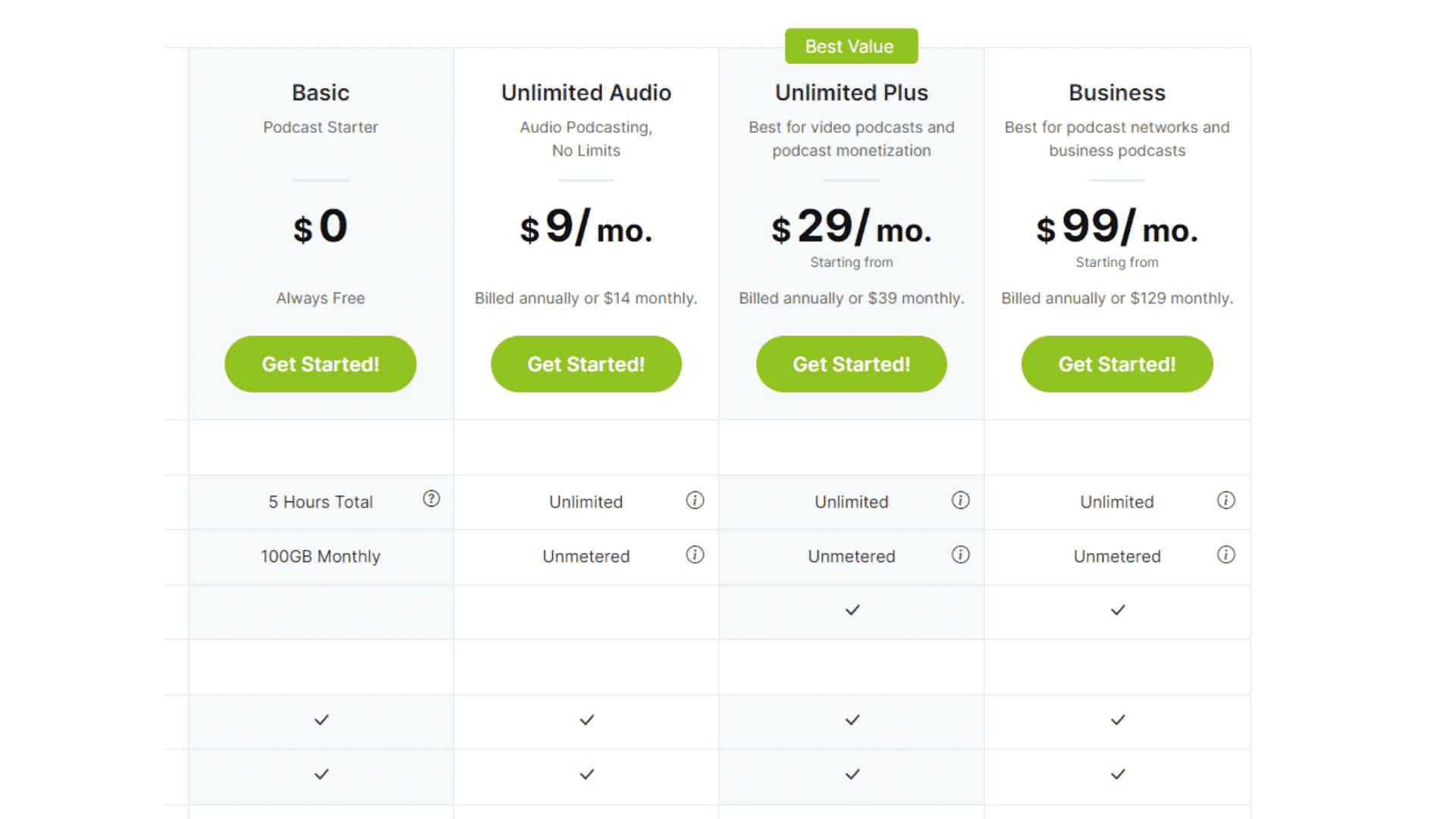
Source: Images from Podbean
- Basic Plan – $0 per month with 100GB monthly
- Unlimited Audio Plan – $9 per month
- Unlimited Plus Plan – $29 per month
- Business Plan – $99 per month
Libsyn
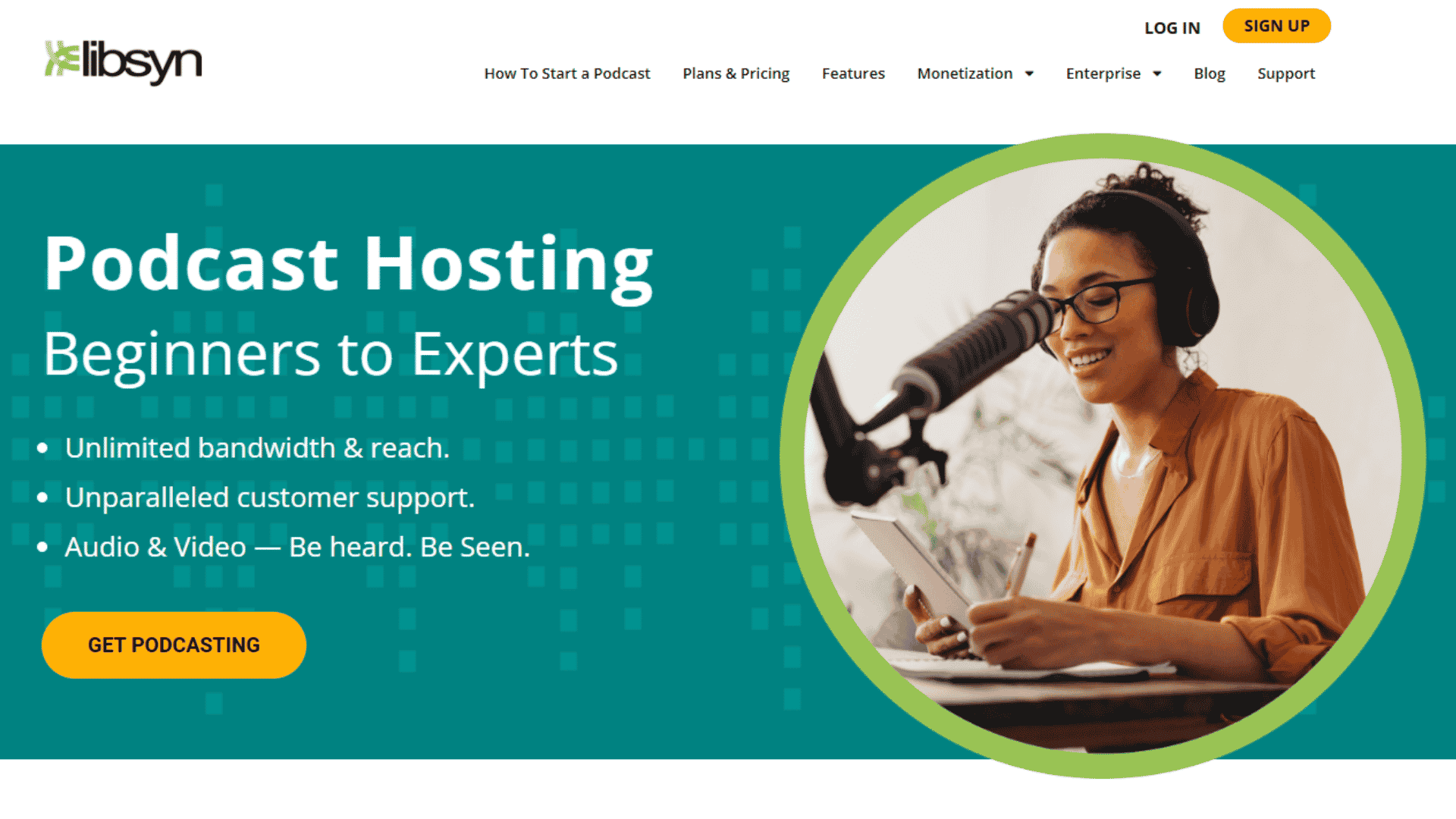
Source: Images from Libsyn
Libsyn is one of the most popular podcasts hosting platforms, used by podcasters of all levels of experience. Though it has many features, its simple interface is one of its most significant selling points. Plus, it is integrated with the WordPress plugin and offers powerful marketing tools to grow your audience.
With Libsyn, users can easily upload audio files and manage them through the site’s web interface. It provides users with statistics about their Podcast’s listens, downloads, and subscribers.
This information can help understand one’s audience and tailor content to them. For podcasters serious about growing their audience, Libsyn also offers many paid plans that provide additional features, such as the ability to release episodes early to subscribers or to have advertising read during the Podcast.
Though there are many options for podcast hosting, Libsyn is a popular choice for its simplicity and robust feature set. You can also create custom RSS feeds, which is excellent if you want to syndicate your show on multiple platforms.
WHAT WE LIKE:
- Custom Podcast Player
- Easy Podcast Monetization
- Social Promotion Scheduler
- Ad-Free Podcast Website
- Integrated with Canva
- Quick Publishing and Drag and Drop feature
- Powerful statistics with a weekly and monthly report
Pricing Plan:
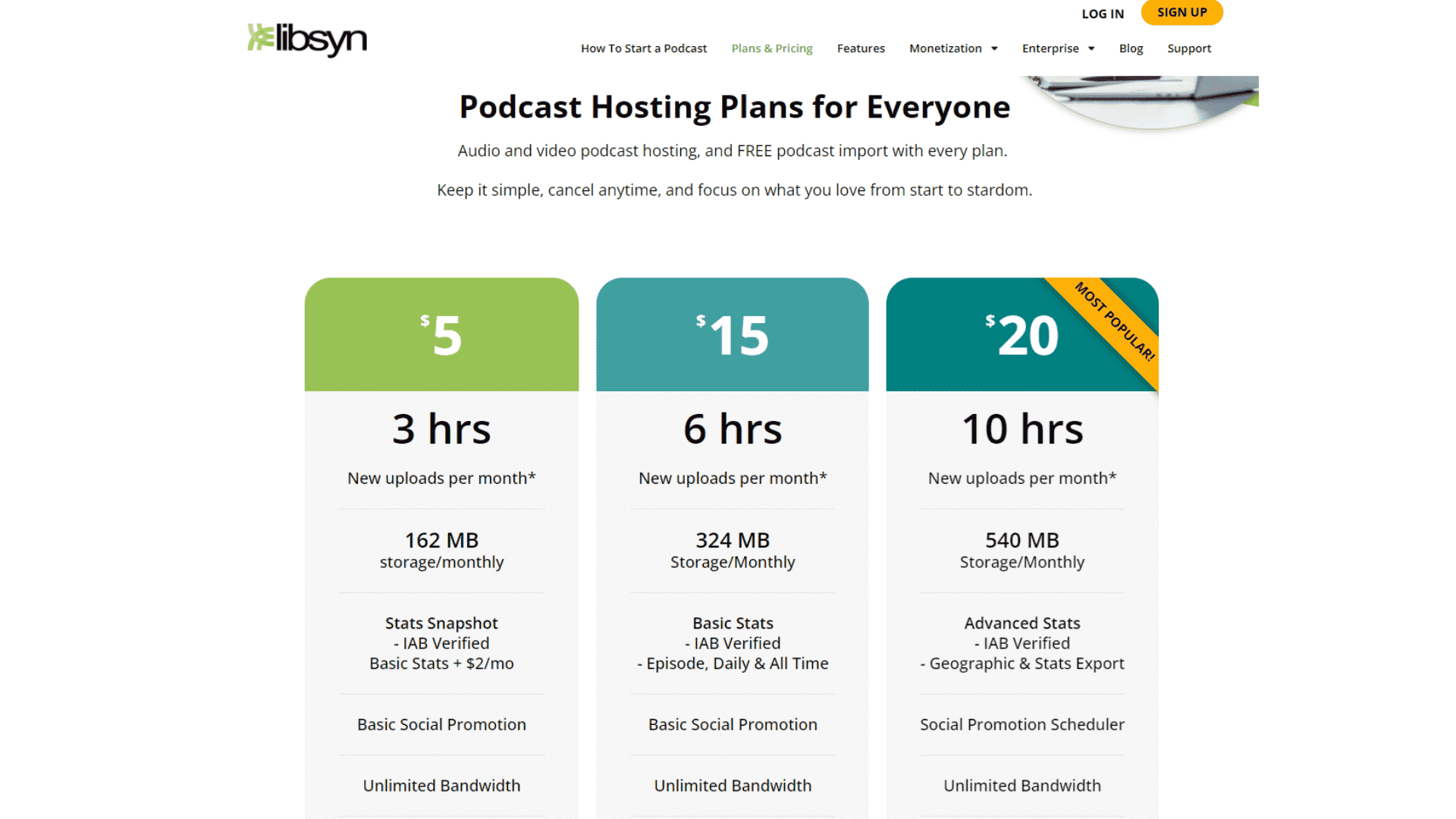
Source: Images from Libsyn
- 3 hrs – $5 per month (162 MB storage monthly)
- 6 hrs – $15 per month (324 MB storage monthly)
- 10 hrs – $20 per month (540 MB storage monthly)
Podcastics
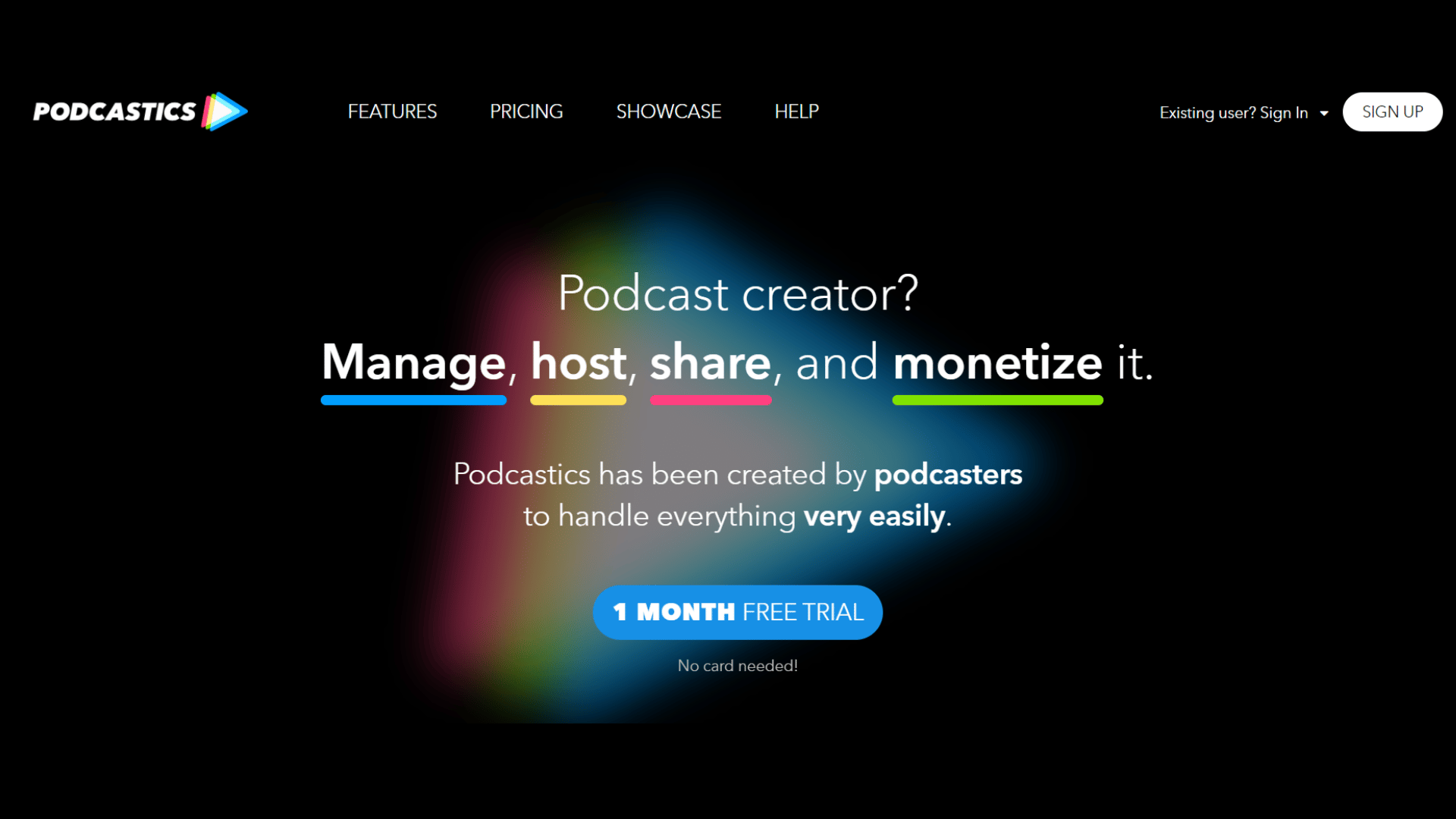
Source: Images from Podcastics
Podcastics is a website that provides tools for hosting, publishing and monetizing podcasts. It offers a variety of features, including RSS feeds, player skins, episode statistics, and more.
Plus, it integrates with popular social media platforms like Twitter and Facebook, making it easy to share your episodes with your audience. You can import your existing podcasts into any RSS feed with easy clicks.
Podcastics is relatively new to the industry but has competitive features driving other podcasters. You can create a team using Podcasts and manage your shows and episodes on one platform. What’s great about this is that it offers automated podcast descriptions.
WHAT WE LIKE:
- You can do a live stream podcast to connect with your audience
- You can publish unlimited episodes with any of their pricing plans
- Allows you to create multiple episodes in a single dashboard
Pricing Plan:
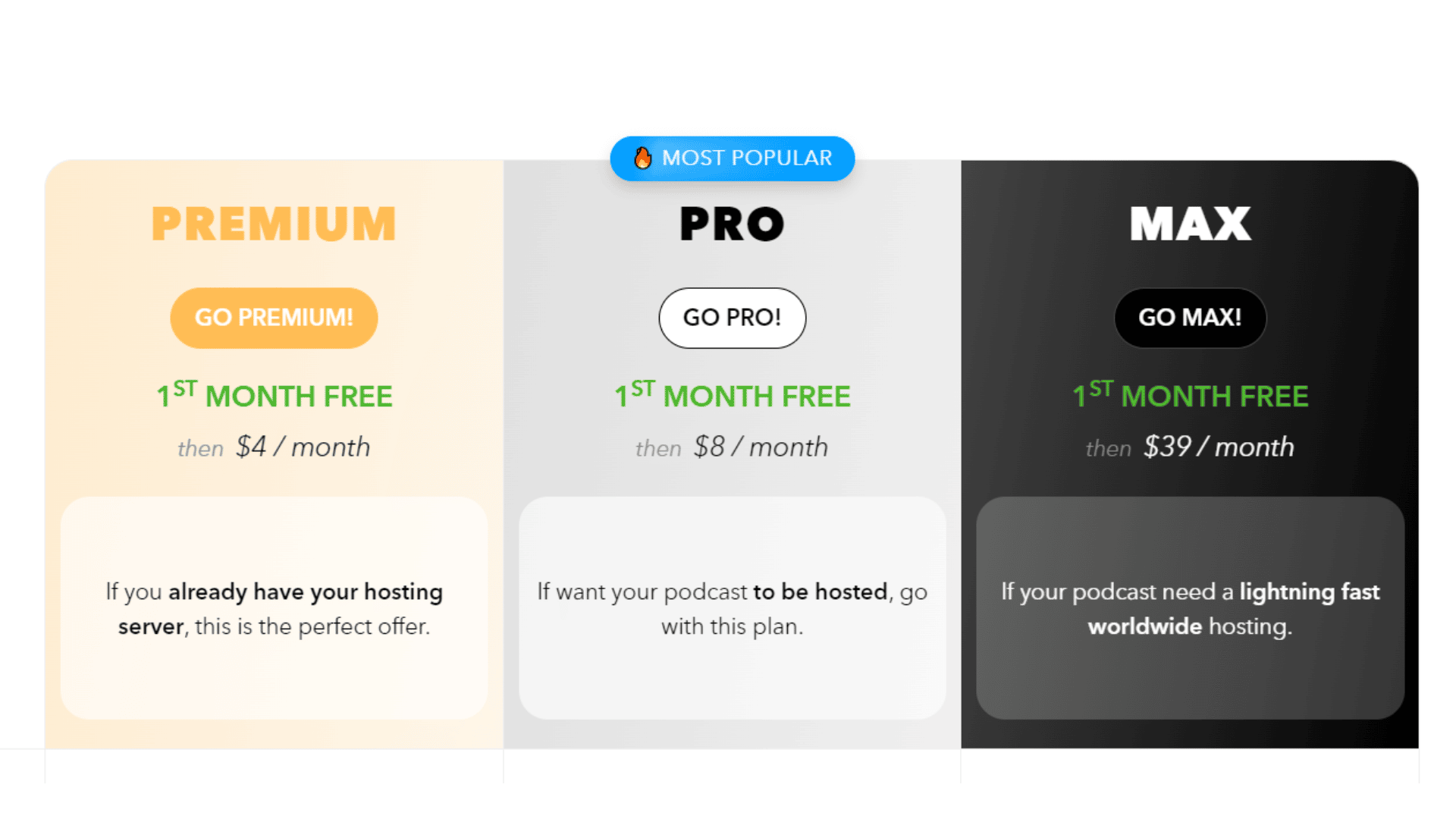
Source: Images from Podcastics
Podcastics provides a long one-month free trial for their three pricing plan:
- Premium – $4 per month
- Pro – $8 per month
- Max – $39 per month
Squarespace

Source: Images from Squarespace
Squarespace is a popular website builder that allows users to create and customize their websites. While it is often used for business or e-commerce purposes, it can also be used to create a podcast hosting site.
Building a podcast hosting site with Squarespace is a simple and efficient way to get started in the podcasting world. With Squarespace, you can create a professional-looking site without prior web design experience.
In addition, Squarespace offers a wide range of features and integrations that make it easy to set up and manage your Podcast. For example, you can use Squarespace to host your audio files, create blog posts about your episodes, and even sell merchandise.
If you’re looking for a platform to help you launch your Podcast, Squarespace is worth considering.
WHAT WE LIKE:
- Allows one-click distribution
- Supports major streaming channels
- Provides powerful data-driven analytics
- Customizable and high-quality podcast templates
Pricing Plan: The pricing plan of Squarespace starts at $16 per month.
PodServe.fm
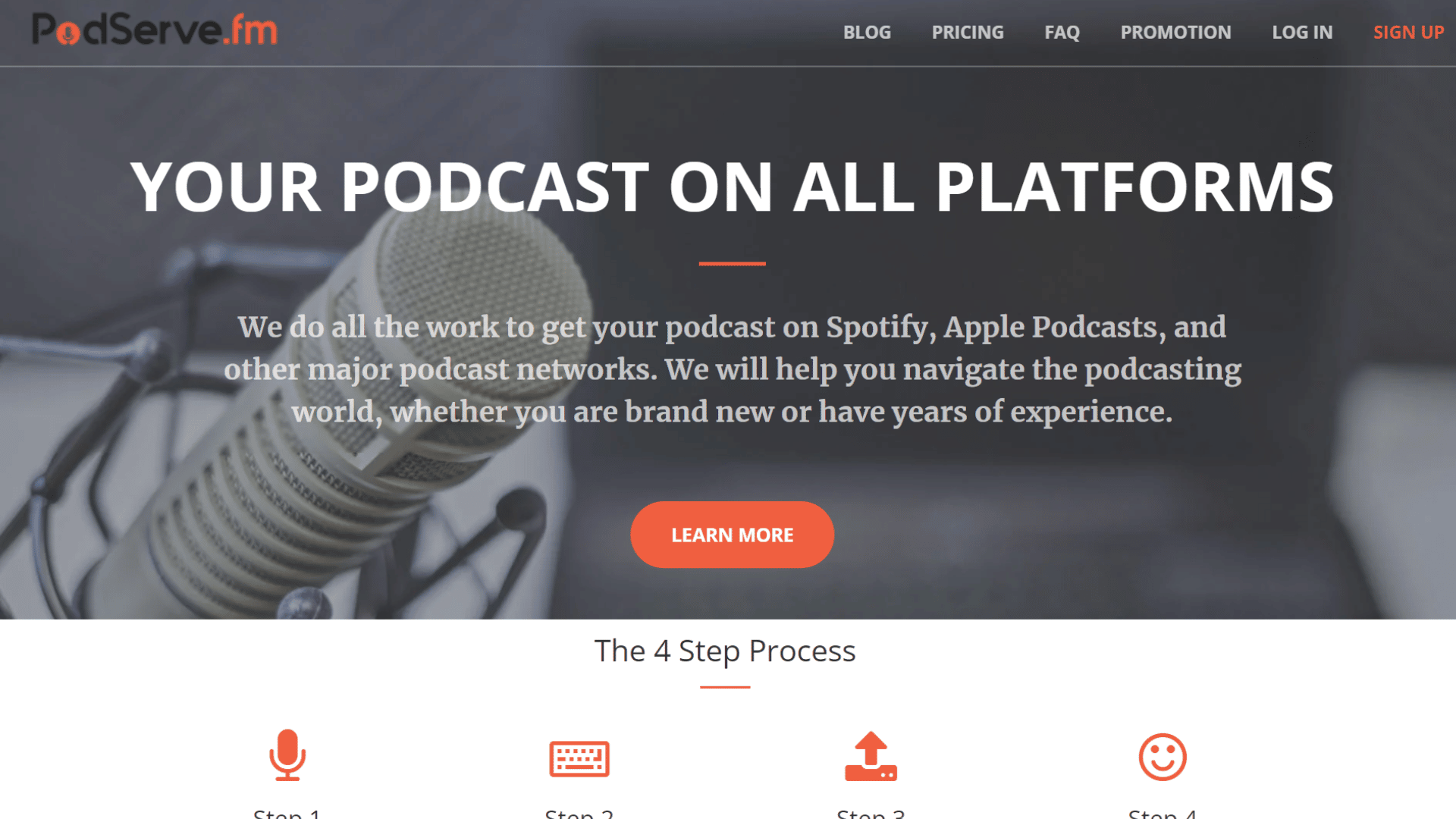
Source: Images from PodServe.fm
PodServe.fm is a new podcast hosting platform designed to make it easy for podcasters to monetize their shows. The service offers a range of features that make it simple to set up subscription options and track listener data.
In addition, PodServe.fm provides tools for managing podcast episodes and files. The platform aims to give podcasters everything they need to run a successful show.
It makes it easy to start making money from your Podcast by providing subscription options and tracking listener data. You can also easily manage your podcast episodes and files, and the platform offers tools for promoting your show. You can get started quickly and easily without expensive equipment or software.
WHAT WE LIKE:
- Unlimited episode content
- Free podcast promotion
- One on one customer support
- Offers unlimited storage and up to 2000GB bandwidth each month
Pricing Plan:
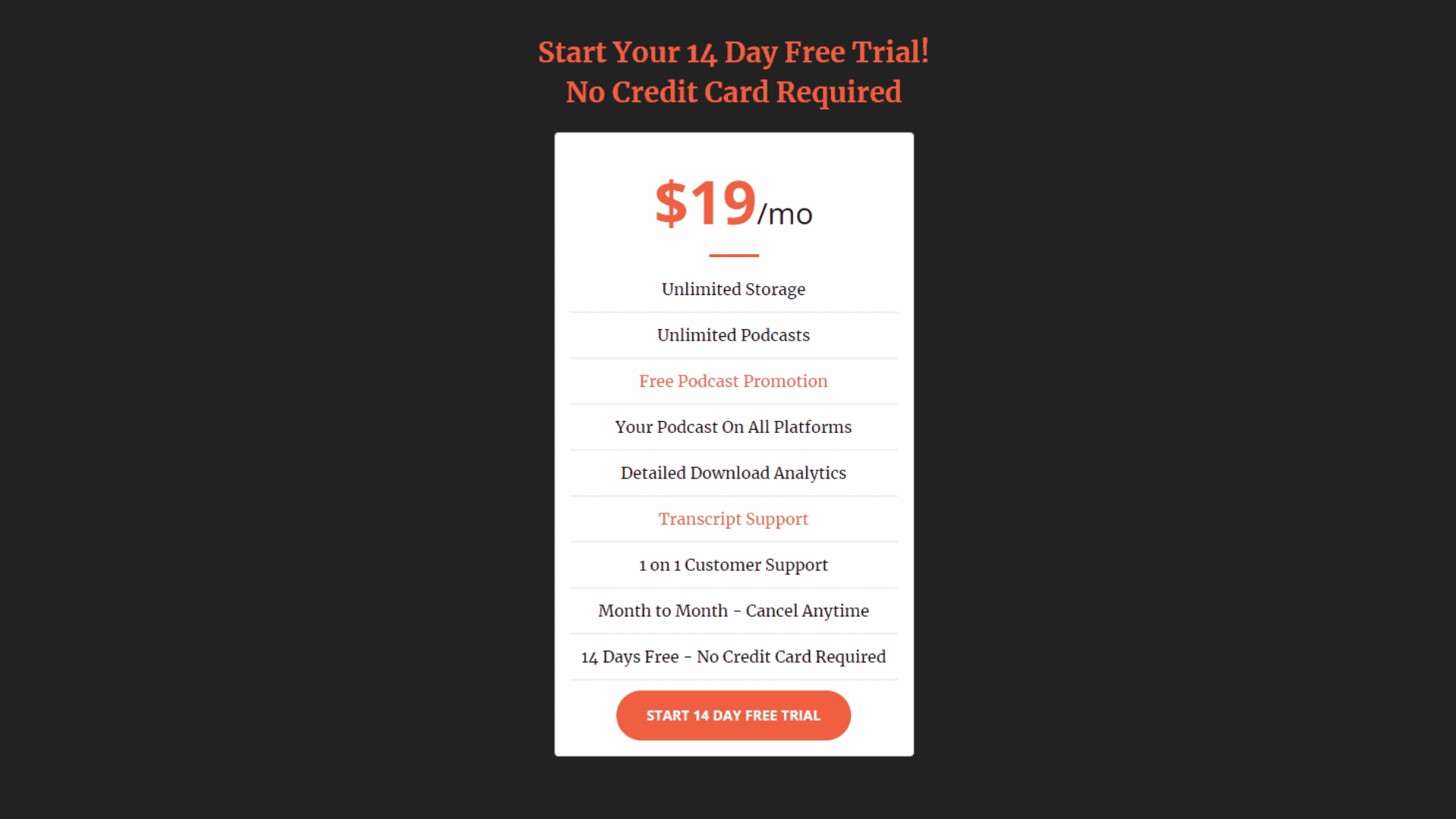
With no credit card required, you can try PodServe.fm for 14 days trial starting at $19 per month.
SoundCloud
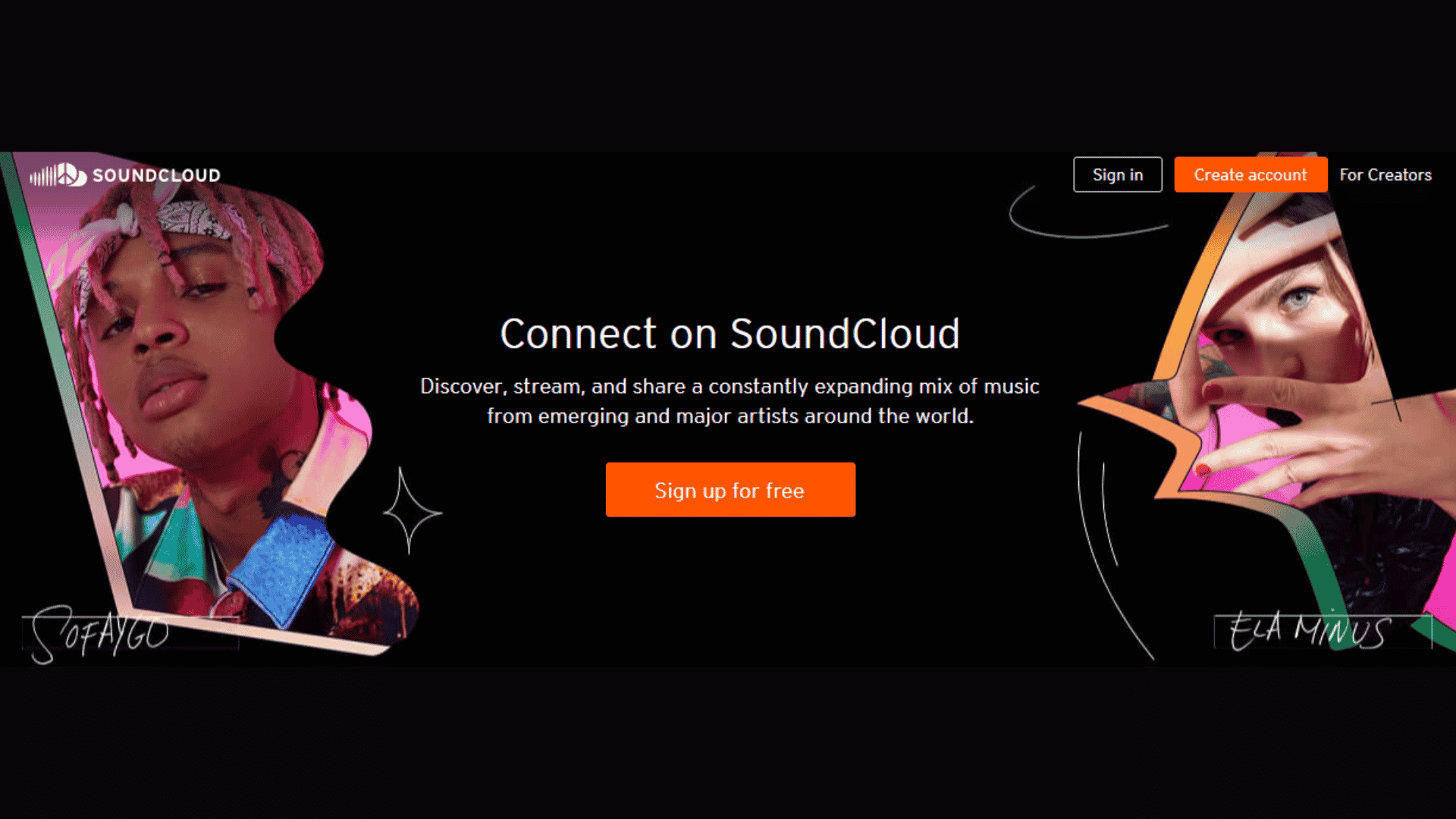
SoundCloud is a widespread audio-sharing platform that allows users to upload, share, and stream their audio files. The site has a simple, user-friendly interface and is perfect for podcast hosting.
With SoundCloud, you can easily share your podcasts with a broad audience and connect with other podcast creators. You can also use the site to promote your podcasts and gain new listeners.
In addition, SoundCloud offers a variety of features that make it an ideal platform for podcast hosting, including the ability to embed your podcasts on other websites, customize your player, and track your stats.
Factors To Consider In Choosing Podcast Hosting Platforms
Cost
How much does the hosting provider charge? When choosing a podcast hosting site, the cost is an essential factor. After all, most podcasters operate on a tight budget and must observe their expenses.
With that said, it’s important to remember that the saying “you get what you pay for” is often true regarding podcast hosting. In other words, the cheapest option is not always the best option.
Instead, it’s essential to strike a balance between cost and quality. Look for a platform that offers a fair price for the features and services you need. And be sure to read reviews from other users before making your final decision.
Storage
How much storage space does the provider offer? And how much storage do you need? How often will you be uploading new episodes? And how long do you want your episodes to be available?
These are all critical questions to ask when choosing a podcast hosting platform. The good news is that many options are available, and most platforms offer a range of storage plans.
Whether you need a few gigabytes or a few terabytes, you should be able to find a plan that suits your needs.
Bandwidth
How much bandwidth does the provider offer? Bandwidth refers to the amount of data that can be transferred in a given period.
For podcasts, this typically translates into the number of listeners that can tune in at once.
If you have a large audience or unpopular timeslots, you may need more bandwidth to accommodate all of your listeners.
Fortunately, many podcast hosting services offer unlimited bandwidth, so you can rest assured that your Podcast will always be available to your listeners.
However, checking the fine print before signing up for a hosting platform is essential, as some companies may charge additional fees for high-bandwidth usage.
By taking the time to understand your bandwidth needs, you can ensure that your Podcast will always be available to your listeners.
Episode limit
Does the provider limit the number of episodes you can publish? Some platforms only allow you to host a certain number of episodes, while others will enable you to host an unlimited number.
If you plan on producing a large number of episodes or want the flexibility to add new episodes at any time, choosing a platform that doesn’t have a limit is essential.
You should also consider the quality of audio files that are accepted. Some platforms only accept high-quality files, while others are more lenient.
If you want your Podcast to sound its best, it’s worth finding a platform that accepts the file type and quality you’re looking for.
RSS feed
Does the provider generate an RSS feed for your Podcast? One crucial factor is whether or not the platform offers an RSS feed. RSS (Really Simple Syndication) is a format that allows users to subscribe to your Podcast and receive new episodes automatically.
Many Podcast hosting platforms offer RSS feeds as standard, but some do not, so it’s essential to check before you sign up. If you’re serious about podcasts, then an RSS feed is necessary.
Without it, you’ll have to rely on listeners checking your website or social media accounts for new episodes, which is far less efficient. Make sure the podcast hosting platform you choose offers RSS feeds before committing.
Directories
Does the provider submit your show to directories like iTunes and Stitcher? Podcast directories are websites where people can find and listen to podcasts on various topics. Many of these directories are organized by topic, so listeners can easily find new shows they may be interested in.
Some platforms offer their podcast directories, while others allow users to submit their shows to popular directories like iTunes and Stitcher. Either way, having access to a directory can help you reach a wider audience and grow your listener base.
Podcast Hosting FAQS
What is Podcast Hosting?
Podcast hosting is a service that provides the server space and tools necessary to publish a podcast. This includes storing your audio files, submitting your show to directories, and generating an RSS feed.
Is Podcast hosting necessary?
If you’re considering launching a podcast, you may wonder if you need to invest in podcast hosting. While there are a few ways to distribute your Podcast without hosting it yourself, hosting comes with many advantages.
For one thing, it gives you more control over how your Podcast is presented to listeners. You can choose the design of your website, add bonus content, and make your show stand out.
Additionally, hosting your Podcast gives you access to valuable data about who is listening and when. This data can help you fine-tune your content and ensure you’re reaching your target audience. So while podcast hosting is not essential, it can be advantageous.
Do I need to have a podcast website for my podcasts?
If you’re thinking about starting a podcast, you may wonder if you need to create a separate website for your show. The answer, unfortunately, is not a simple one.
While there are benefits to having a dedicated website for your podcast (such as building credibility and establishing a professional brand), it’s not essential.
In many cases, your existing personal or business website will be perfectly adequate. However, if you want to maximize the reach and impact of your podcast, having a dedicated website is worth considering.
It will give you more control over the look and feel of your show and make it easier for listeners to find and subscribe to your episodes.
Ultimately, whether or not to create a separate website for your podcast should come down to what’s best for your particular situation. If you have the time and resources to invest in a dedicated site, go for it! If not, don’t worry – you can still have a successful podcast without one.
Why do I need a Podcast Hosting Provider?
Anyone considering starting a podcast has probably wondered, “Why do I need a podcast hosting provider?” The simple answer is that a hosting provider gives you a space to upload your podcast episodes so that your listeners can download them.
But there are more benefits to using a podcast hosting provider than just storage space. A good hosting provider will also give you access to tools that make it easy to submit your podcast to iTunes and other directories, track your downloads, and get detailed insights into who is listening to your show.
In addition, most podcast hosting providers offer monthly or yearly plans, so you can choose the option that best fits your budget. A podcast hosting provider is essential to any successful podcasting operation.
What is a private subscriber feature in a podcast?
A podcast is a digital audio file made available on the Internet for downloading to a computer or portable media player, typically known as a series, new installments that subscribers can receive automatically.
Private subscriber features in podcasting allow podcasters to create a unique RSS feed that includes bonus content not found in the regular RSS feed. This bonus content is only accessible to subscribers who are logged in with their username and password.
By offering exclusive content to private subscribers, podcasters can build a loyal following and generate additional income. In addition, private subscriber features often include access to special episodes, archival materials, and behind-the-scenes information.
For example, many popular podcasts offer subscriber-only bonus episodes that feature extended interviews, outtakes, and exclusive commentary. Some podcasts even offer physical rewards for subscribers, such as T-shirts, stickers, and mugs. By becoming a private subscriber to a podcast, listeners can support the show while gaining access to unique benefits.
Can I use a free Podcast Hosting Platform?
There are many factors to consider when starting a podcast, but one of the most important is finding a reliable hosting platform. A good host will provide you with all the tools you need to create and distribute your Podcast and give you access to a broad audience.
But with so many options, it can be hard to know where to start. If you’re on a tight budget, you may wonder if you can get by with a free podcast host.
The answer is yes, but it comes with some caveats. Free hosts often place ads in your Podcast, which can be frustrating for listeners. They may also restrict how often you can release new episodes or how long each episode can be.
And because free hosts don’t have the same financial incentives as paid hosts, they may not offer the same level of customer support. So if you’re serious about starting a podcast, it’s worth investing in a paid host. But a free host can be a good option if you’re just getting started and want to test the waters.
Where should I publish my Podcast?
If you’re ready to start sharing your Podcast with the world, you may be wondering where to publish it. Deciding where to publish your Podcast can be a tough decision. There are a lot of different platforms out there, and each one has its benefits and drawbacks.
Ultimately, it comes down to personal preference and what you’re looking for in a podcasting platform. Apple Podcasts is a good choice if you’re looking for the widest possible audience.
It’s the most popular podcasting platform and is available on iOS and Android devices. Spotify is another good option if you’re looking to reach a large audience. It’s trendy among younger audiences and offers some unique features like episode streaming and recommendations.
If you’re more interested in finding a dedicated audience of listeners, then Google Podcasts is a good option. It’s not as popular as the other two platforms, but it’s growing quickly and offers excellent features like listener analytics and custom RSS feeds. The best platform for you will depend on your specific goals and preferences.
Podcast Hosting Storage and Bandwidth: How do they work?
When you first start a podcast, you need to find a host. This service will store your media files (usually an MP3) and make them available for download by your listeners.
Your host will also provide you with a web page where people can go to find and subscribe to your show. Many podcasters use a ‘hosted’ solution, where the host takes care of all the technical details and provides an easy-to-use interface for managing your show.
However, some podcasters prefer a ‘self-hosted’ solution, which hosts their media files and manages their website. Regardless of your choice, it’s crucial to understand how podcast hosting works before you start.
When you upload a media file to your host, they will assign it a unique URL. This URL is what you’ll give to people when they want to subscribe to your show or download an episode. Your host will also provide you with code you can embed on your website.
This code will show a ‘play’ button next to each episode on your site, and people can click this button to play the episode directly in their web browser. Most hosts will give you statistics about your downloads, so you can see your show’s popularity and which episodes are being downloaded the most.
How do I switch to my podcast from another podcast host?
Switching to a new podcast host can be a big decision, but it doesn’t have to be complicated. You can follow a few simple steps to make the transition as smooth as possible.
First, you’ll need to export your RSS feed from your host. This will give you a file to import into your new host.
Next, you’ll need to update your DNS settings to point to the new server. Depending on where you host your podcast, you may also need to update your iTunes settings. Once everything is set up, you can start publishing your episodes on your new host.
How often should I publish a podcast?
There is no easy answer if you’re wondering how often you should release new podcast episodes. It depends on several factors, including the length of your episodes and the frequency with which you can produce high-quality content.
Most experts agree that a weekly release schedule is an excellent start. This will allow you time to plan and record each episode while maintaining a regular publishing schedule.
Of course, if you’re struggling to meet this goal, it’s perfectly acceptable to slow down the frequency of your releases. The important thing is to find a schedule that works for you and that you can stick to over the long term.
Podcast Monetization – How to Earn Money
There are many ways to monetize a podcast. The most common is advertising, but there are also opportunities for sponsorships, product placements, and affiliate marketing. Here are seven ways to monetize a podcast:
Advertising
This is the most common form of monetization and can be done through pre-roll or post-roll ads or by sponsoring an episode. Podcast advertising can be a great way to earn money and build an audience for your show.
In addition, by carefully choosing the placement and frequency of your ads, you can ensure that they add to the overall quality of your show instead of feeling like a disruptive force. When done well, podcast advertising can be a win-win for you and your listeners.
Sponsorships
A sponsor is an organization or company that pays you to mention them on your show. They may also provide you with products or services to give away as prizes. To find sponsors, you need to have a large and engaged audience.
Once you have built up a following, reach out to companies you think would be a good fit for your show. Include statistics about your audience in your pitch, and mention any previous sponsorships.
If you can secure a sponsor, be sure to deliver on your promise of exposure. Mention the sponsor at the beginning and end of the episode, and work their name into the conversation naturally.
You should also promote the sponsor on social media and other marketing channels. By delivering value to your sponsors, you can build long-term relationships that will provide a steady income for your Podcast.
Podcast sponsorships are somewhat similar to advertising but usually involve a more direct relationship between the Podcast and the sponsor.
Product Placements
Product placement is a form of advertising where businesses pay to have their products featured in the Podcast. For example, if a podcast about fashion features a particular brand of clothing, that brand has paid for product placement.
By featuring a particular product within their show, podcasters can receive compensation from the company. This compensation can take the form of direct payment, or it can be in the form of free products or services.
In some cases, companies may also offer to sponsor an entire podcast episode. Product placements can be a great way to earn additional income but ensuring that the featured products are relevant to the show and its audience is vital.
Otherwise, listeners may become annoyed or feel they are being sold. Podcasters should also disclose any relationships they have with the companies whose products they are featuring. This will help to ensure that their audience trusts them and their recommendations.
Affiliate Marketing
Affiliate marketing is performance-based marketing in which a business rewards one or more affiliates for each sale or customer brought about by the affiliate’s marketing efforts.
To be successful with podcast affiliate marketing, you need to find products that your audience will be interested in and that you can promote in a way that adds value to your show.
It would be best if you also built up a rapport with your listeners so that they trust your recommendations.
Crowdfunding
Crowdfunding platforms like Patreon or Kickstarter allow listeners to contribute financially to shows they enjoy. In exchange, podcasters often offer exclusive content or merchandise to their patrons.
For example, a listener might pledge $5 per month to receive early access to episodes or $20 per month to receive a monthly care package with show-branded swag.
Merchandise
To generate additional revenue, many podcasts sell branded merchandise like t-shirts, mugs, and notebooks. Podcasters can also sell products related to their show’s topics, such as books or course materials.
Premium Content
Some podcasts offer premium content like bonus episodes or ad-free versions of their show for listeners willing to pay extra. This is usually done through subscription services like Patreon or iTunes.
Conclusion
There’s no denying that podcasts are becoming more and more popular. And with that popularity comes a need for quality podcast hosting.
But with so many options out there, how do you choose the right one for you?
The first step is to decide what your needs are. If you’re just starting, you might not need all the bells and whistles that come with some of the more expensive hosting options.
On the other hand, if you’re looking to grow your audience and attract new listeners, you’ll want to ensure you have a host that can accommodate your needs.
And once you’ve found a few that look promising, be sure to sign up for their free trials so you can try them out and see which one is the best fit for your show.
We hope this article has helped you narrow down your choices and find the perfect host for you.